



FROM THE PRESIDENT OF THE AFRICAN MARKETING CONFEDERATION








ELCOME TO OUR FINAL magazine edition of 2024.
As we close out the year, the AMC Executive extends best wishes to you and yours for a safe and relaxing year end.
I’m sure you’ll agree that our last issue was a bumper one that, apart from the usual interesting articles, showcased our 2024 conference is its full glory. However, the team has not rested on its laurels and we’re busy finalising the dates and venue for next year’s AMC conference to be hosted by the CIMG in Ghana.
We have also recently reconstituted our four working committees (Research, Education, Publications and Events) and start some interesting new projects in early 2025.
I was honoured to attend the Asia Marketing Federation’s World Marketing Forum in Manila during November, held in conjunction with the annual conference of the Philippine Marketing Association.
›
The thought-provoking theme was ‘Marketing Wars’, exploring the dynamic clash between human ingenuity and advanced technology. Speakers gave great insights into this
Dates for 2025 AMC Conference in Ghana: 20-22 August! Save the date!
topical theme, which we also discussed during our AMC gathering in Mombasa. It was great to see our AMF friends again and brainstorm future areas of collaboration.
I’m also thrilled to announce that we have signed an MOU of collaboration with the European Marketing Confederation, with whom we also have projects planned. This is in line with the goal of internationalising the AMC for the benefit of our members. More about this initiative on page 31.
See you in 2025!
MESSAGE DU PRÉSIDENT DE LA CONFÉDÉRATION

BIENVENUE DANS LE DERNIER NUMÉRO DE notre magazine de l’année 2024. En cette fin d’année, le Comité exécutif de la CAM vous souhaite, à vous et à vos proches, une fin d’année sereine et reposante.
Je suis persuadée que vous conviendrez que notre dernier numéro était un numéro exceptionnel qui, outre les articles intéressants habituels, présentait notre conférence de l’année 2024 dans toute sa splendeur. Cependant, l’équipe ne s’est pas reposée sur ses lauriers et nous sommes occupés à finaliser les dates et le lieu de la CAM de l’année prochaine, qui sera organisée par le CIMG au Ghana.
Nous avons également reconstitué récemment nos quatre commissions de travail (recherche, éducation, publications et événements) et nous lancerons de nouveaux projets intéressants au début de l’année 2025.
J’ai eu l’honneur de participer au Forum mondial du marketing organisé par la Fédération asiatique du marketing à Manille en novembre, en même temps que la conférence annuelle de l’Association philippine du marketing.
Le thème « guerre du marketing » suscite la réflexion et explore l’affrontement dynamique entre l’ingéniosité humaine et les technologies de pointe. Les conférenciers ont apporté un éclairage intéressant sur ce thème d’actualité, que nous avons également abordé lors de la réunion de la Commission de contrôle de la CAM à Mombasa. Ce fut un plaisir de revoir nos amis de la FAM et de réfléchir à de futurs domaines de collaboration.
Je suis également ravie d’annoncer que nous avons signé un protocole d’accord de collaboration avec la Confédération européenne du marketing, avec laquelle nous avons également prévu des projets. Cette initiative s’inscrit dans le cadre de l’objectif d’internationalisation de la CAM au profit de nos membres. Plus d’informations sur cette initiative, consultez la page 31.
Rendez-vous en 2025 !
Helen McIntee
BA MBA (Wits) CM (SA)
Cofondateur et président :
Confédération africaine du marketing
BEM-VINDO À NOSSA ÚLTIMA EDIÇÃO DA revista de 2024. Por ocasião do fim do ano, o Executivo da AMC deseja para si e para os seus entes queridos um final de ano seguro e descontraído.
Tenho a certeza de que concordará que a nossa última edição foi uma das melhores que, para além dos artigos interessantes do costume, apresentou a nossa conferência de 2024 em toda a sua glória. No entanto, a equipa não ficou parada e estamos a trabalhar para definir as datas e o local da conferência da AMC do próximo ano, que será organizada pelo CIMG no Gana. Recentemente, reconstituímos também os nossos quatro comités de trabalho (Investigação, Educação, Publicações e Eventos) e iniciámos alguns novos projectos interessantes no início de 2025.
Tive a honra de participar no Fórum Mundial de Marketing da Federação Asiática de Marketing em Manila, em Novembro, que decorreu em conjunto com a conferência anual da Associação de Marketing das Filipinas.
O tema para reflexão foi “Guerras de Marketing”, explorando o choque dinâmico entre o engenho humano e a tecnologia avançada. Os oradores deram grandes ideias sobre este tema actual, que também discutimos durante o nosso encontro da AMC em Mombaça. Foi óptimo rever os nossos amigos da AMF e trocar ideias sobre futuras áreas de colaboração.
Tenho também o prazer de anunciar que assinámos um Memorando de Entendimento de colaboração com a Confederação Europeia de Marketing, com a qual temos também projectos planeados. Isto está de acordo com o objectivo de internacionalizar a AMC para benefício dos nossos membros. Mais informações sobre esta iniciativa estão disponíveis na página 31.
Vemo-nos em 2025!
Helen McIntee
BA MBA (Wits) CM (SA) Cofundadora ePresidente: Confederação Africana de Marketing
PUBLISHER
African Marketing Confederation
https://africanmarketingconfederation.org info@africanmarketingconfederation.org
PUBLISHING COMMITTEE
Kwabena Agyekum (Chair)
Helen McIntee
Nigel Tattersall
Mike Simpson
A.M.C. PRESIDENT
Helen McIntee
A.M.C. SECRETARY GENERAL
David Balikuddembe
EDITORIAL
Simpson Media
Editor: Mike Simpson
mike@media-simpson.com
ADVERTISING SALES & COORDINATION
Avenue Advertising
Managing Director: Barbara Spence
Landline: +27 11 463 7940
Mobile: +27 82 881 3454
barbara@avenue.co.za
DESIGN & LAYOUT
Tamlin Lockhart Design tamlin@tamlinlockhart.co.za
PRODUCTION
Reproduction: Tamlin Lockhart Design Digital magazine: Belgium Campus Print magazine: Business Print
IN ASSOCIATION WITH Angola Marketing Network
Chartered Institute of Marketing, Ghana
Ethiopian Marketing Professionals’ Association Institute of Marketing in Malawi
Institute of Marketing & Management, Mauritius Institute of Marketing Management, South Africa
L’Association Marocaine de Marketing et de la Communication
L’association Tunisienne des Professionnels de Marketing et de la Communication
Marketing Association of Botswana
Marketers Association of Zimbabwe
Marketing Society of Kenya
Mozambique Marketing Association
National Institute of Marketing of Nigeria
Tanzania Marketing Science Association
Uganda Marketers Society
Zambia Institute of Marketing
Dates for 2025 AMC Conference in Ghana: 20-22 August! Save the date!
issue of Strategic Marketing for Africa for 2024. I’m sure I’ve said this before, but what a year it’s been for the African Marketing Confederation and, indeed, the entire profession on the continent!
Since the 2024 AMC Marketing Forum in Mombasa in late September, it has been a whirlwind few months. Planning has already started for the 2025 conference taking place in Ghana and, just as we were completing this issue of the magazine, 2025’s conference dates were confirmed. They are 20-22 August. Grab your diary. Block off the dates. It’s going to be epic!
Giving our members access to marketing thought leadership and best practice is at the core of the AMC’s ethos and the cornerstone of this magazine’s philosophy. Which is why the AMC’s collaborations with the Asia Marketing Federation and European Marketing Confederation are so important. You can read more about both of those important and dynamic relationships on pages 18-19 and pg 31, respectively.
There is always a significant amount of focus in this publication on martech, digital strategies, and their relevance to our daily marketing lives. Rightly so. It is changing the face of the profession.
But amidst all the talk of influencers, social media plans, online strategies and AI there is a reality check.
Mobile internet penetration in sub-Saharan Africa is still at less than a third of the total population. Read that again. Well over 60% of the people in SSA are, right now, largely immune to our shiny digital strategies. You can read a summary of the latest report by the GSMA, the body representing mobile network operators worldwide, on pg 32, which points out that SSA remains the least connected region in the world. Obviously, this varies by country, area and urban versus rural populations. And there are likely very good arguments that your target market is urban, affluent and oh-so digitally connected. But it’s food for thought and a reality check.
And be mindful that finance folk and the boardroom marketing sceptics may just remind you of this reality the next time you’re motivating for more digital spend in the budget.
My favourite article in this issue? Perhaps I’m sentimental, but it’s the activation by MTN Uganda that saw a struggling single mother presented with a new vehicle to keep her informal business alive. Of course, the brand got something out of it too. But it’s a win-win.
It’s also reminder that good marketing is about connecting with real people and making their lives better. Find out more on pages 48-49 and be sure to click on the video links. Keep some tissues handy.
Enjoy the read. Let’s have an awesome 2025 together!
Mike Simpson Editor
Consumers in Africa increasingly expect brands to avoid insulting, insensitive or biased messaging
It is vital that African marketers understand the continent’s constantly evolving landscape of attitudes and values
There’s a new generation in town. Generation Alpha is tech-savvy, opinionated and socially influential
In 2018, Rwanda’s tourism marketing body took a bold step and sponsored Arsenal FC. Has it worked?

The African Marketing Confederation was an honoured guest at the World Marketing Forum in Manila
Morocco has big tourism development plans ahead of 2030 World Cup, including in the MICE sector
48
Is West Africa’s ancient fonio grain destined for global stardom, thanks to an American brewmaster?
The European and African confederations are joining forces to advance the global marketing landscape
SSA’s mobile internet penetration is less than a third of the population, creating a ‘substantial usage gap’
Amazon’s SA launch offers brands a unique opportunity. But get the basics right first
IMM Institute CEO is encouraging more SA marketers to be involved in AMC’s events and activities
IMM Institute launches its Innovation and Creativity Hub for SMMEs, as well as an SMME Associateship
Fruit vendor and struggling mother of five has her ‘death trap’ pickup replaced in tear-jerker activation
50 SECONDHAND MARKETS
Growing reliance on secondhand goods shows how economic challenges are reshaping consumer behaviour
53 MEMBER NEWS: MALAWI
Malawian marketers enjoy their 2024 conference and elect George Damson as the new President of IMM Malawi
54 LUXURY MARKET
The market for luxury brands in Africa is showing surprising resilience
55 INFORMAL ECONOMIES
Nigeria’s ‘forgotten’ informal economy is to receive more support, government says as report is launched
56 MEMBER NEWS: GHANA
CIMG National President outlines many successes in a busy year that included the release of two reports
Confederation is the groundbreaking pan-African body of marketing professionals spearheading the ongoing development of the highest possible standards of marketing across Africa. Founded in 2011, the AMC is a collaboration between the various national marketing bodies and
L’ASSOCIATION
The AMMC (English name: Moroccan Association of Marketing and Communications) was created in 2013 as a platform for the country’s marketing and communication communities. Its aim is to promote the professions, develop the skills and knowledge of members, and promote the economy of Morocco.
Visit Facebook page

MARKETING ASSOCIATION OF BOTSWANA
More information coming soon!
associations to exchange expertise and information, as well as to promote the marketing profession as a whole. By unifying the bodies in the various countries, the AMC exchanges expertise and information, provides intellectual capital, and ensures that the continent has a platform for like-minded marketing professionals.
ANGOLA MARKETING NETWORK
More information coming soon!
Established in 2012, the aim of the ATPMC (English name: Tunisian Association of Marketing and Communications Professionals) is to offer the country’s marketing and communications professionals privileged access to a network of colleagues and high-level industry experts. It also promotes the image of marketing and communications in Tunisia. Visit website
NIMN was established by Act of the National Assembly no. 25 of 2003 with a chartered status conferred on it, the responsibility to regulate and standardise marketing professional practice through the conduct of professional examinations and certifications, training, retraining and consultancy services geared towards ensuring that members adopt a professional approach to marketing.
Visit Website

The Chartered Institute of Marketing, Ghana was founded in July 1981 with the vision to be the voice of marketing practice in Ghana. The Chartered Institute of Marketing, Ghana (CIMG) ultimately aims to see organisations (both private and public) embrace the marketing concept, and be marketingoriented in their operations.
Visit Website

The Institute of Marketing Management South Africa (IMM) has for decades been the pre-eminent marketing institute in Southern Africa, bringing together likeminded individuals and organisations to share thoughts and experiences within the rapidly changing marketing environment. The IMM South Africa offers a range of activities and services for marketing professionals.
Visit Website

Uganda Marketers Society is the premier organisation for marketers in the country, dedicated to promoting excellence in the field. UMS provides a range of resources and opportunities for skill-building, so members can stay up-to-date with the latest trends and best practices in marketing. We help members become the best marketer they can be.
Visit Website

MSK is the national umbrella body for all marketers in Kenya. Its key mandate is to empower and regulate the marketing industry by creating policy that governs the Marketing Industry (self-regulated), education and training of professionals, corporates and entrepreneurs, marketing and business mentorship, and arbitration through the Advertising Standards Board.
Visit Website

The Tanzania Marketing Science Association is a one-voice platform which harmonises the knowledge and practice of marketing in Tanzania. TMSA’s aim is to achieve a strong marketing professional ecosystem in Tanzania by driving collaboration between industry and marketing experts. Its services include professional training programmes, ranging from certified to professional marketer.
Visit website

The Marketers Association of Zimbabwe was launched in 2007 with a vision to be a leading body of marketing professionals promoting professionalism of the highest standards, and establishing channels of career development for the benefit of organisations and the Zimbabwean economy at large. Visit Website

The Ethiopian Marketing Professionals’ Association is a beacon of marketing excellence, officially recognised and licensed by the Ministry of Justice under Proclamation No. 621/2009. The EMPA’s goal is ambitious but tangible: To emerge as Africa’s leading marketing association and catalyse engagement, education, inspiration, and the training of exceptional marketing professionals.
Visit Website

The Zambia Institute of Marketing is a professional marketing institution that was established by an Act of Parliament No. 2 of 2022 to regulate, promote, uphold and improve the standards of training, practice and professional competence of persons and organisations engaged in marketing and advertising in Zambia.
Visit Website

The Mozambique Marketing Association (MMA) was established in 2024 and is dedicated to the development and promotion of marketing practices in Mozambique. MMA’s mission is to promote excellence in marketing and contribute to the development of the sector, providing assistance, training and resources to professionals, and serving as a platform for networking and knowledge exchange.

Established in 1991, the Institute of Marketing & Management is the leading professional marketing education and training institution of Mauritius.
No Website

IMM Malawi is a locally recognised and registered marketing body, whose agenda is to promote, enhance, and regulate the marketing profession in Malawi, with the aim of developing marketers into positions of influence. IMM Malawi started in January 2021, transitioning from the Chartered Institute of Marketing (CIM) Malawi.
Visit Website





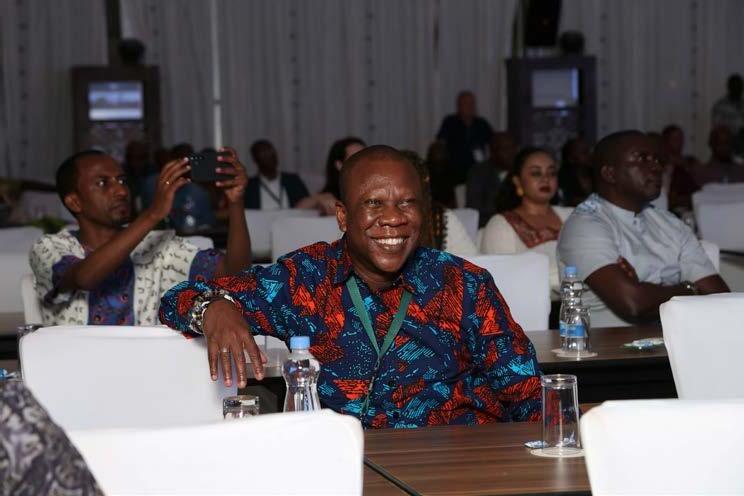





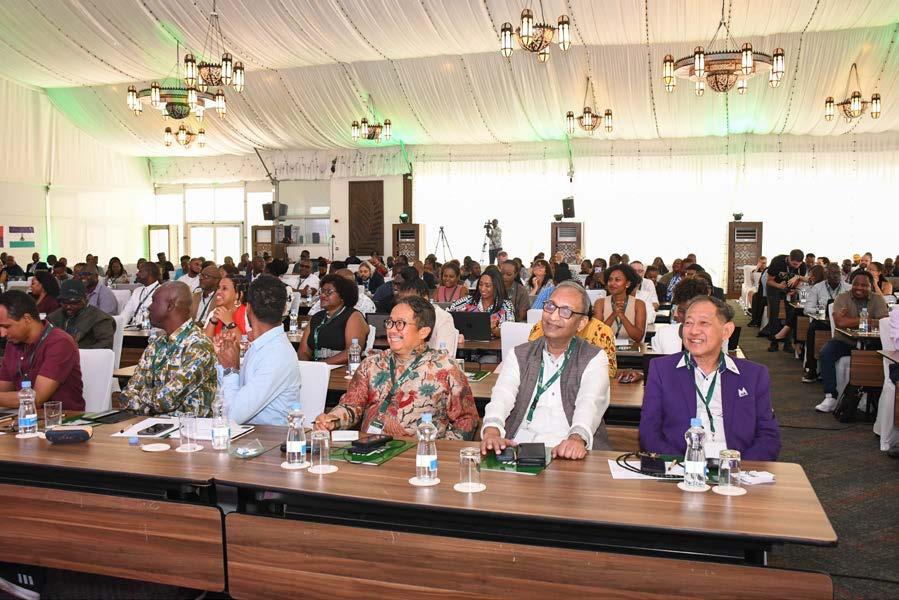










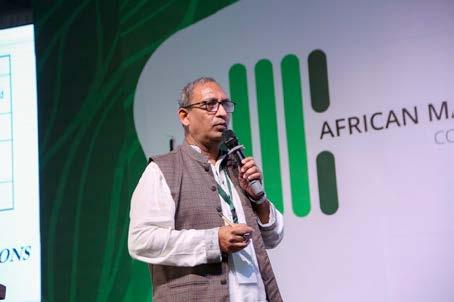


Consumers in Africa and elsewhere increasingly expect brands to use DEI thinking to avoid insulting, insensitive or biased messaging. Cara Bouwer explains.
GOOGLE WAS IDENTIFIED as the world leader in brand inclusivity following the release of a substantive survey by Kantar in 2024. The marketing data and analytics firm surveyed more than 23,000 people across 18 countries – including Nigeria, South Africa and Kenya – to compile the Kantar Brand Inclusion Index 2024. The research team also made a business case for brands to embrace diversity, equity and inclusion (DEI) across external marketing efforts and as a barometer of corporate culture.
Kantar’s study is claimed to be the first global overview of how marketers are using DEI thinking to avoid insulting, insensitive or biased brand messaging – and why this approach seems
increasingly important to consumers. It also builds on the previous efforts of individual countries and companies.
For instance, in 2021 a South African marketing industry alliance comprising various organisations and companies launched a World Federation of Advertisers (WFA) Global Diversity, Equity & Inclusion Census. Earlier in 2024, Dr Okey Okere, Managing Partner at The Culture Factor Africa, showcased Nigeria’s DEI efforts. The company helps businesses in Nigeria and other parts of Africa to leverage culture as a tool for business performance.
In the case of Nigeria, The Culture Factor Africa showed a high correlation between ethnic diversity and return on assets in the West African nation. It
noted that diverse teams were 70% more likely to capture new markets, while financial returns were “35% more likely higher in ethically diverse teams”.
As such, Okere’s report made a case for using the language of inclusion, embedding this mindset across the culture of a brand and reinforcing delicate sensitivities by employing diverse teams with different perspectives.
Similarly, Kantar’s recent 2024 report notes that “75% of consumers globally say that diversity and inclusion – or the lack thereof – influence their purchase decisions”. It also highlights that, of the 46% of respondents who reported

experiencing some kind of discrimination in the past year, those levels are more pronounced in emerging economies (64%) than in developed nations (36%) and often impact the most vulnerable in society.
According to Amit Nanoo, Human Centric Growth Strategist in Kantar’s Insights Division, what sets Africa apart from the rest of the world is that while, globally, minorities and marginalised groups are underserved, “in Africa it’s the majority of people who are underserved”.
What does this mean for Africafocused brands? “People [in Africa] are looking to brands to take up the social and commercial responsibility to be more inclusive,” explained Nanoo during a Kantar webinar attended by Strategic Marketing for Africa
Since many individuals surveyed by Kantar reported incidents of discrimination at work or in interactions with a commercial brand (72%), the company’s Senamile Zungu, Commercial Lead: South Africa, stressed the importance of brands treating people as equals and making
consumers “feel accepted and respected”. This is particularly true among the youth.
“Globally there is a generational shift that is shaping culture and brand expectations,” elaborated Zungu. While 43% of Baby Boomers (aged 60-78) rated DEI as being important to them, that percentage stands at 83% for Gen Z individuals (aged 12-27), who said that DEI “influences their buying decisions”.
Zungu explained that DEI is personal for people in emerging markets, and Africa in particular, where culture and diversity “are lived experiences”. She noted that various young global stars from the continent are willing to have frank discussions about culture and identity. These include Kenyan-Mexican Oscar-winning actress Lupita Nyong’o, South Africa’s Grammy Award-winning singer Tyla, and Nigerian Afrobeats musician Burna Boy.
With the growing youth population across Africa, it is essential for any brand operating on the continent to

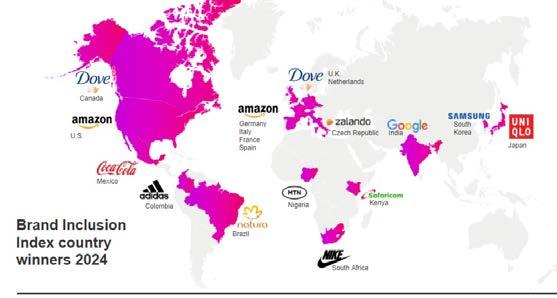
consider evolving consumer preferences, said Kene Esiobu, Kantar’s Nigeria-based Associate Account Director: Insights Division during the webinar.
However, he warned against brands alienating or ignoring other consumer segments in the process. Instead, a conscious DEI strategy should be deployed that ensures all voices are heard and factored in.
This approach, said Esiobu, would also help brands to differentiate their message by bringing something “meaningfully different” to the table.
“Being meaningfully different drives more demand,” he said. “We found that brands that are meaningfully different to more people command five times more penetration today than brands that aren’t, and they also have an advantage of penetration growth over the next two years.”
Mary Kawira, Kantar’s Kenya-based Associate Account Director, noted that while Google headlined the global survey, each of the three African

countries included in the survey had a different top brand, based on inclusion: Nike in South Africa, Safaricom in Kenya, and MTN in Nigeria.
Each of these brands touched on the core macro-themes evident among African consumers: belonging and progress. For instance, sportswear company Nike grabbed the opportunity to connect with South African consumers by taking a clear position in support of Olympic gold medallist Caster Semenya, modelling a campaign around her and celebrating her achievements.
Similarly, in other regions of the world, Kawira noted how skincare brand
Dove challenged beauty stereotypes by showcasing diverse women to “emphasise that beauty comes in all shapes, sizes and skin tones”. This, she said, resonated with Africa consumers “who are tired of narrow beauty ideals”.
The likes of Dove and Nike were able to craft these inclusive messages because they understood the tensions and aspirations in society, and listened to what consumers wanted – including those who are underrepresented, Kawira observed.
This enabled them to achieve a messaging that seemed “natural and not forced”. A fact that was supported by having “authentic representation both in front of and behind the camera”.
According to Kawira, not only does this approach reinforce the authenticity of the brand, it addresses the expectations of people in society.
“Businesses have a responsibility to end discrimination,” she said.
“Discrimination experiences are most common among under-represented groups like LGBT+, poor people and
darker-skinned people. People with neurodiversity and thinking challenges also find this to be true.”
Recognising their power to affect change, the likes of African-born telecommunication companies Vodacom and MTN are already taking a stand to address gender inclusivity. In the case of Vodacom, this means investing in ‘Code Like a Girl’ bootcamps for females. The programme tackles the low representation of women in science, technology, engineering and mathematics (known as STEM) education on the continent.
Similarly, MTN partners with the UN Women HeForShe campaign to create opportunities for women with the hope that, by 2030, they will make up 50% of the tech workforce.
The researchers emphasise that these choices are not made haphazardly. They are clearly defined opportunities for brands to connect with the people whose values align with their own. It’s also a marketing affinity that can act as
a strong commercial catalyst for growth.
The Culture Factor’s Dr Okere is perplexed that more African companies are not using the inclusivity lever in their marketing approaches.
As he wrote in the Nigeria-focused DEI report: “We cannot over-emphasise our concern about corporate Nigeria’s low level of ethnic diversity, equity, and inclusion. While the nation’s ethnic diversity occurs naturally, the level of equity and inclusion is far below what is required.”
Okere believes bringing underrepresented groups into corporate leadership is one way to start, particularly when it comes to greater representation for women. This supports the Kantar finding that authenticity must be a central tenet of any brand’s DEI messaging – even before the commercial appeal of such a strategy becomes increasingly alluring. When brands proactively, boldly and legitimately stand up for something, they win more favour from audiences, stresses Nanoo. Their heart, however, must be firmly aligned to the cause.
Cara Bouwer is an experienced writer, independent researcher, journalist and editor. Her words appear in media articles around the world, in business case studies, white papers, insight reports and corporate copywriting.
Amit Nanoo, Human Centric Growth Strategist at Kantar, believes every brand emerging from Africa or operating on the continent should be asking itself the following core questions:
● What are the biggest barriers for your brand when taking a social stand?
● Is your brand deeply connected to culture?
● Are you solving social issues that matter to people?
● Which people might be excluded by your current approach?
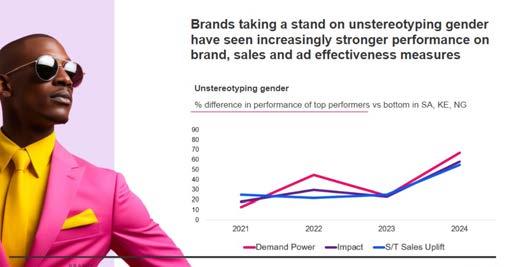

The ability to adapt and innovate in response to evolving new consumer trends is crucial for African businesses, governments and communities, writes Mac Mabidilala
IN OUR MODERN WORLD change is the only constant, so it is vital that African marketers understand the continent’s constantly evolving landscape of public attitudes and values.
Our recently released Ipsos Global Trends 2024 report, titled ‘In Search of a New Consensus: From
Tension to Intention’, interviewed more than 50,000 people across 50 markets to create an overview of the global sentiment that captures the complexities and nuances of our times.
Six of the countries covered by the study are in Africa: South Africa, Zambia, Nigeria, Kenya, Egypt and Morocco. Here, we delve into five key
trends from the report, as viewed through the lens of African consumers.
BALANCING LOCAL AND GLOBAL
The concept of globalisation has undergone significant transformation over the past decade. While the world

› African marketers must understand the continent’s constantly evolving landscape of public attitudes and values
remains interconnected, there is a growing recognition of the winners and losers in this global mesh.
In Africa, countries like South Africa and Nigeria have seen an increase in positive perceptions of globalisation, with many viewing it as a catalyst for economic growth and development. According to the study, 75% of respondents in Nigeria and 70% in South Africa believe that globalisation has a positive impact on their country, highlighting a general optimism towards global interconnectedness.
However, this optimism is tempered by concerns over national sovereignty and cultural identity. In Kenya and Zambia, there is a strong sense of national pride, with 82% of Kenyans and 78% of Zambians expressing pride in their nationality. This duality reflects a broader global trend where people
appreciate the benefits of a globalised world, but also yearn for a stronger sense of local identity.
For businesses operating in Africa, the challenge lies in leveraging global scale while remaining attuned to local nuances – a delicate balance that could determine success in these markets.
Across the African continent, rising inequality is a pressing issue, exacerbating societal divides and fostering new political allegiances.
In Nigeria and South Africa, the wealth gap is particularly pronounced, leading to increased social tensions and a demand for more equitable economic policies. Our study indicates that 72% of Nigerians and 68% of South Africans feel that the economy is rigged to benefit the rich and powerful, underscoring the need for systemic change.
These countries exemplify the global trend of splintered societies where traditional structures are being challenged and redefined. In this environment, businesses and governments are called upon to demonstrate a commitment to shared values and inclusivity. Initiatives that focus on reducing inequality and fostering social cohesion are not only ethically sound but also essential for long-term stability and growth.
Brands that align with these values are likely to resonate more deeply with African consumers who are increasingly conscious of social justice issues.
Africa stands at the forefront of technological innovation, with countries like Kenya and Nigeria leading in mobile money and fintech solutions.
In Kenya, 88% of respondents acknowledge the positive impact of technology on their lives, and 85% in Nigeria echo this sentiment. The
continent’s leapfrogging of traditional technologies presents immense opportunities for economic development. However, this technowonder is accompanied by concerns over privacy, job displacement, and the ethical use of technology.
In South Africa and Egypt there is a palpable tension between the excitement for technological advancements and the fear of their potential misuse. Public sentiment reflects a desire for technologies that enhance life without compromising personal freedoms or employment opportunities.
For policymakers and tech companies, the challenge is to build trust by ensuring transparency and prioritising the human element in technological innovations.
Climate change is a unifying concern across the globe, and Africa is no exception. The impacts of climate change are increasingly evident, with countries like Zambia and Morocco investing in climate resilience and sustainable practices. Public opinion in these regions demonstrates a strong consensus on the need for immediate action to mitigate environmental disasters, with 92% of Zambians and 89% of Moroccans expressing concern over climate change.
In Nigeria and Egypt, there is a growing awareness of the role individuals and businesses must play in achieving climate goals. However, the path forward requires clear leadership and tangible actions from both governments and corporations.
Brands that can demonstrate a genuine commitment to sustainability are likely to gain trust and loyalty from


consumers who are becoming more environmentally conscious.
Trust is an increasingly valuable commodity in today’s complex and information-saturated world. Our report highlights that 80% of respondents across Africa are more likely to trust new products if they are made by brands they already know. However, only 55% are willing to spend extra for brands with an appealing image, indicating that trust is not just about image but also about delivering on promises and providing value.
In markets like South Africa and Nigeria, where economic challenges and political uncertainties are prevalent, trust in institutions is varied.
For instance, 71% of South Africans and 67% of Nigerians express concern about the ability of governments to address future challenges.
This scepticism extends to businesses, with 61% in South Africa believing that companies do not pay enough attention to the environment.
For brands and organisations, building and maintaining trust involves transparency, consistent quality, and aligning with consumer values. Those that succeed in doing so can foster deeper connections with their audiences,
turning trust into a competitive advantage in the African market.
The Ipsos Global Trends 2024 report underscores the complexities and interconnections of modern life.
In Africa, navigating these trends requires a nuanced understanding of local contexts and global dynamics. As we move from tension to intention, the ability to adapt and innovate in response to these trends will be crucial for businesses, governments, and communities alike.
By embracing the opportunities and addressing the challenges presented by globalisation, societal divides, technology, climate change, and trust, Africa can chart a course toward a more inclusive and sustainable future. As the continent continues to evolve, we must remain vigilant and proactive in shaping a future that reflects our shared values and aspirations.
Readers of our Digital Edition can download the full global report here
Mac Mabidilala is Chief Client Officer and Head of Strategy3, leading the development of Ipsos’ business and growth advisory across sub-Saharan Africa, as well as leading the client organisation in South Africa. Mac’s background is in marketing, strategy
Among the key global takeaways from the Ipsos 2024 report:
There are tensions at all levels. Socio-political tensions about the very ideas of globalisation, tensions within markets, tensions between citizens, and even tensions within households.
There are also tensions within each of the trends. For example, nostalgia is a shared value and a powerful tool for bringing us together. But, taken further, that idea can cause a rift between those who yearn for what they see as traditional values and others whose sense of identity is shifting.
Brands, businesses, organisations and governments have roles to play in everything from combatting global problems like climate change, to helping us express ourselves as individuals. Determining what those roles are and how to demonstrate you’re playing them authentically is complicated.
and innovation client-side roles, coupled with intrapreneurial and entrepreneurial agency-side roles in research and consulting. He has pan-African experience across 15 markets.
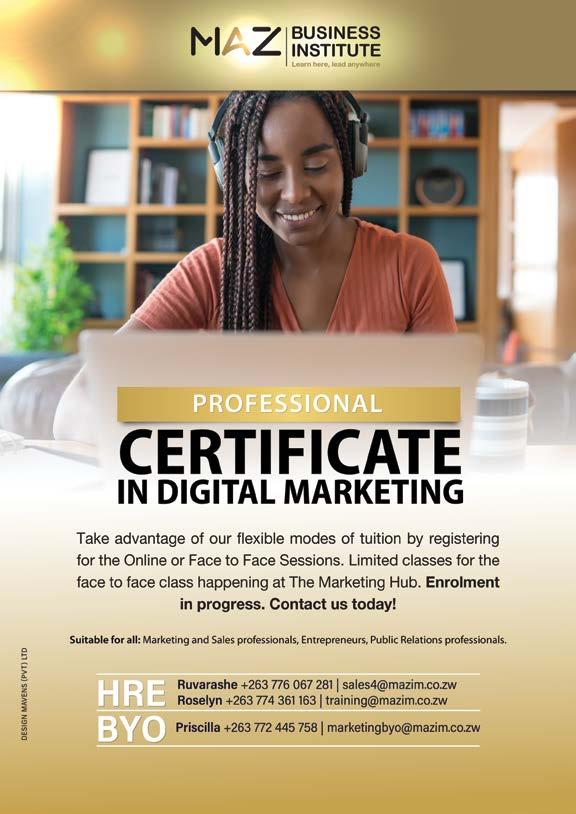
› Entering into the spirit of the theme. World Marketing Forum panellists with their Star Wars light sabres and clothing

African Marketing Confederation is an honoured guest at World Marketing Forum in Philippines and at AGM of Asian marketing body.
AMC CO-FOUNDER AND President, Helen McIntee, recently attended the Asia Marketing Federation’s 4th World Marketing Forum held in Manila, hosted by the Philippine Marketing Association.
Held under the theme ‘Marketing Wars 6.0 and Beyond’, the opening ceremony was “breathtaking”, McIntee comments, and included a host of characters from the Star Wars movie franchise – among them Stormtroopers and Darth Vadar.
Even guest speakers and panellists were willing to join in the fun, and appeared on stage with light sabres (fictional laser swords from the movie) and Star Wars clothing.
“The conference itself was rich in content and the speakers were
both entertaining and educational,” McIntee says.
She was also an invited guest at the Asia Marketing Federation (AMF) annual general meeting, held concurrently with the forum, and was privileged to be present when the new President of the AMF, Mr Jack Xin Yao of China, was elected. He takes over the reins from Professor Syed Ferhat Anwar of Bangladesh, who was a guest speaker at the 2024 AMC Marketing Forum held in Mombasa, Kenya recently.
“On behalf of the AMC, we would like to congratulate all the new AMF office bearers,” McIntee says.
The new office bearers are: Ms Shanshan Li (Secretary General), Mr Roger Wang (First Vice President), Mr
Jack Xin Yao (President), Professor Syed Ferhat Anwar (Immediate Past President), Dr Somchat Visitchaichan (Second Vice President).
Earlier this year, the AMC signed a memorandum of understanding with the Asia Marketing Federation that will foster collaboration, growth and knowledge sharing between the two continents. Among the planned projects is an Asia-Africa Marketing Conference.
“There are many collaborative initiatives planned for the AMC and AMF for 2025, all of which will offer value to our AMC members as we continue connecting with marketing professionals globally,” McIntee states. Look out for updates in future issues of the magazine.


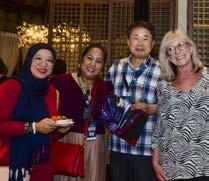


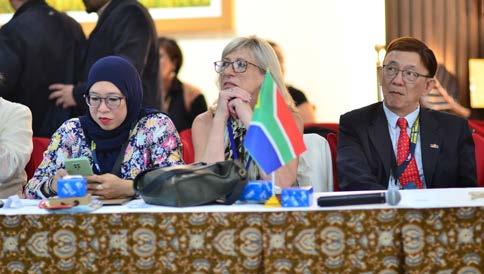









Graduate Career-Ready with the Professional Skills and Business Knowledge for Success in Any Industry.
Industry-Connected Curricula with the Latest Trends, Knowledge and Skills Sought-After by Top Local and International Companies.
Globally Recognised Marketing and Supply Chain Qualifications.





There’s a new generation in our cities, towns and villages. Generation Alpha promises to be techsavvy, opinionated and socially influential. How can marketers grow with them? By Cara Bouwer.
UNDERSTANDABLY, marketers around the world
– and notably in Africa – have been focusing time and resources getting to know Generation Z. While there are some blurred lines around when each cohort begins and ends, Gen Zs are generally regarded as being born between 1997 and 2009, with Gen Alpha between 2010 and 2024.
From 2025, the next kids in town are
Generation Beta. But marketers still have a few years to get to know them.
For now, with the youngest Gen Zers already in their mid-teens, the focus is shifting to the toddler and pre-teen Gen Alpha market which is fast revealing an array of unique values and buying preferences.
Already, argue marketing academics like Dr Ayo Oniku from the University of Lagos: “The generation represents a
potential segment in every family’s buying decision process, societal and state future generation plans, and individual parents’ buying behaviours.”
Writing in Nigeria’s Business Day newspaper, Oniku challenges the view that because Gen Alpha is not physically handing over cash to businesses, their preferences are not shaping buying decisions within their families.
Oniku argues that, compared to

previous generations, these youngers wield unprecedented influence over family buying behaviours and their future needs and preferences are key considerations in decisions to buy specific brands of cars or to live in areas with good schools.
So, who are these behind-the-scenes family influencers? Globally, the Generation Alpha market is expected to reach two billion people by 2025 –making them the consumers to watch
in the future. They are also the first and largest generation to grow up in a very connected world – in the case of wealthier urbanised young Africans, a fully connected world – which gives them a unique life perspective and an often-astonishing level of comfort with multiple technology forms and platforms.
In Africa, the Generation Alpha cohort is even more significant, given the continent’s population growth and high youth dividend. In the recent Discovering Generation Alpha report by African marketing research and strategy firm Pierrine Consulting, the authors note that by 2024 there were around 200-million young people in the Gen Alpha bracket across the continent.
“This generation is predominantly concentrated in urban areas, experiencing lifestyles distinct from their rural counterparts,” the authors wrote. This is a telling differentiator considering that “urbanisation trends indicate that by 2030, more than half of Africa’s population will reside in urban regions”.
Growing up in an urban setting is already shaping the way pre-teens in Africa consume. Born into technology, their need for digital devices and access to content platforms is innate. This unprecedented access to information and ideas means that even at their young age they are wide awake
› The interplay between Gen Alpha’s online and physical worlds opens up interesting possibilities for brands
to issues of wellness, sustainability and the power of personal identity.
As Pierrine Consulting highlights, this is already translating into the need for fashion brands to demonstrate their commitment to inclusivity, or for streaming services to provide the sort of short-form content that appeals to young viewers – for whom gaming and virtual reality experiences are part of their leisure and entertainment time.
This gamification and personalisation of services is also filtering into more serious topics, like financial services and education, where connecting with Gen Alphas means using technology seamlessly.
It is telling that, as the source of Africa’s future economic growth, Gen Alpha is already featuring as a discussion point at heavyweight business gatherings like the Africa CEO Forum.
During the 2024 gathering in Kigali, Rwanda, Mwasi Wilmore, CEO of Tanzania-based learning edutainment firm Ubongo, told a panel discussion that Gen Alpha displays conscientiousness, boldness and ambition. They are very strong in terms of diversity, equity and inclusion. That combination, she said, means “they are going to demand a lot more from us”.
For marketers, in particular, this means greater transparency and clarity of purpose. As Wilmore noted: “We also have to be willing to face our skeletons

in the closet, the things that we may not have done right, the injustices that we may have seen happen and we haven’t addressed.”
If brands aren’t willing to work on these issues, Gen Alpha will not be shy to make their demands known – after all, they already have practice demanding experiences, technology and consumables based on their likes and dislikes.
So, how should African marketers be using this intel? Referencing this ‘pester power’ Gen Alpha have over their parents, Pierrine Consulting explains that marketers should consider leveraging “the persistent requests of children, which can often lead to impulse buys or planned purchases by parents seeking to satisfy their children”.
This need for instant gratification is likely to continue, and develop further, as Gen Alpha matures and takes control of their own budgets. Interestingly, that evolution might come sooner than many anticipate.
Already, across Europe, the Middle East and Africa, strategists like Stavros Triseliotis and Sophie Tanner are noting that “a significant 31% of 10-14-yearolds report earning their own money, a staggering 51% increase over just two years”. As Triseliotis and Tanner wrote in a 2024 blog for The Insights Family, a market intelligence business that operates across six continents and 22 countries, this trend extends to those as young as six and indicates a hunger among Gen Alphas for financial independence and control of their own buying choices.
For brands, this entrepreneurial young generation with their digital acuity and desire for self-expression requires a transparent, personalised touch which simultaneously addresses the practical needs of their parents around cost and safety.
However, as Triseliotis and Tanner warn: “For marketers targeting Gen Alpha, a unique opportunity arises:
engaging directly with kids rather than solely relying on parental influence. However, this necessitates responsible and balanced messaging.”
This delicate hand extends not only to the content marketers are directing towards young Alphas, but the platforms they use. Early indications are that Gen Alpha are more open than previous youth cohorts to engaging offline.
As consumer research company GWI notes, in 2021 Gen Alpha was more likely to spend weekends talking to friends online, rather than engaging in person. By 2022, that had shifted to “real-world activities like gym class/ sports, which has wider implications for the kinds of entertainment kids are seeking”.
This does not mean that Gen Alpha is turning its back on online content. The GWI report – which covered 14 markets including South Africa, Mexico, Brazil and the USA – noted that the pre-teens were still using on average 4.2 streaming services, from YouTube to Netflix and Disney+, and spending large amounts of time with unsupervised access to games consoles, tablets and mobile phones.
However, the interplay between their online and physical worlds certainly opens up interesting possibilities for brands.
For instance, enterprising brands might consider creating safe spaces in which youngsters can connect. Cheryl Calverley and Paul Billingsley, from the UK’s #IRLrevolution movement (a parent-led movement to create spaces for teenagers to socialise in real life), explain that brands like Nando’s are getting the mix right by developing spaces “where teenagers are welcome alongside adults, and treated as valuable customers. They work intentionally to create a brand and experience that is genuinely inclusive, bringing young people into their community and creating an experience that works as hard for 15-year-olds on a Friday evening as for families on a Sunday afternoon.”
Similarly, in the global beauty market, brands like Estée Lauder are conscious
that they are dealing with an empowered, informed and confident generation. As Colleen Funkey, Vice President Consumer Insights at The Estée Lauder Companies, puts it, Gen Alpha consumers want to “feel seen”. This includes, Ipsos research shows, having fun with product names and bright colours, making skin care regimes less intimidating, and including light and fun short-form videos as part of youth-orientated marketing strategies. Ultimately, Gen Alpha may be the generation that really does want it all – and they are going to make marketers work for their custom and their loyalty. Readers of our Digital Edition can access the referenced content here:
● Dr Ayo Oniku’s article in Business Day Nigeria: https://businessday.ng/ bd-weekender/article/youngconsumer-purchase-behaviours-thecase-of-the-gen-alpha/
● Video of Mwasi Wilmore’s comments during the 2024 Africa CEO Forum in Kigali: https://www.youtube.com/ watch?v=XelJuVL7ZGw
● Stavros Triseliotis and Sophie Tanner’s blog for The Insights Family: https://theinsightsfamily.com/ news/empowered-spenders-howgen-alpha-is-shaping-the-market-andhow-should-brands-approach-them
● Consumer research company GWI’s Generation Alpha report: https:// www.gwi.com/reports/gen-alphaglobal-cs
● Cheryl Calverley and Paul Billingsley’s article for WARC: https://www.warc. com/newsandopinion/opinion/ are-brands-serious-about-makingthe-lives-of-young-peoplebetter/6734
● Ipsos webinar on Decoding Gen Alpha Beauty: https://www.ipsos. com/en-us/decoding-gen-alphabeauty-unlocking-tween-market

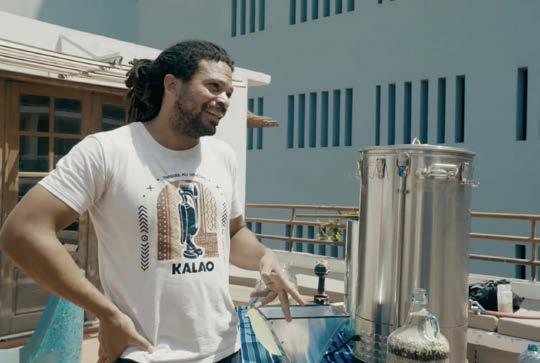
It’s 5,000 years old but mostly unknown outside West Africa. Now, thanks partly to an American brewmaster, fonio’s star is on the rise. By Mike
Simpson
FONIO, AN ANCIENT grain celebrated in West Africa for thousands of years but still relatively unknown to most people, is about to get an image boost. This is thanks to the far-sighted efforts of an innovative multi-award winning brewmaster from a boutique brewery in Brooklyn, New York City.
Garrett Oliver, a 30-year veteran of Brooklyn Brewery, has been dabbling with fonio grain as a key ingredient in craft beer since 2019. But it’s only recently that he has really thrown his weight behind fonio-based craft beer and, in 2024, has led an international campaign to take fonio beers to consumers around the world.
In doing so, he has enlisted the help of global brands Carlsberg and Guinness, as well as local boutique breweries in Senegal, the UK, Sweden, US and China.
Each brewery produces its own limited-edition beers to spotlight fonio’s remarkable qualities and potential to drive a more sustainable future. Each brewer contributes his or her own creativity to the lineup of beers. Everything then comes together under the ‘Brewing for Impact’ banner devised by Oliver.
It’s widely used in African food ›
For the uninitiated, fonio is widely used in African cooking and is considered to be the oldest West African cereal. It is used, to a greater or lesser degree, in Guinea, Nigeria, Togo, Benin, Mali, Burkina Faso, Côte d’Ivoire, Niger, and The Gambia.
According to the Science Direct website, it is flexible in that it is grown on the plains as well as in the mountains, and will grow under rainfall conditions that vary from 400mm to 3,000mm. Fonio is also capable of thriving in poor, rocky and marginal soils.
Oliver explains: “In some ways ‘Brewing for Impact’ is the most important work I’ve ever done. If what we’ve started truly catches hold in the industry, we will hopefully start seeing the wider use of a grain that has no need for irrigation, fertilisers, pesticides or other chemical inputs.
“It also supports soil regeneration while providing a vital source of income for thousands of smallholder farms in West Africa, which are predominantly female-led – all while making some
really fantastic beers. What more can you ask for?”
Brewing for Impact is rooted in Oliver’s belief in beer’s power to unite people and communities. To embrace his vision on an international scale, he mobilised the diverse coalition of brewing partners to work alongside his own Brooklyn Brewery.
A portion of the proceeds from all the beer sold under this campaign go to The Michael James Jackson Foundation for Brewing and Distilling, an organisation founded by Oliver that is dedicated to funding scholarship awards for black, indigenous, and people of colour within the brewing and distilling trades.
Garrett’s brewing exploration with fonio was inspired by Senegalese chef Pierre Thiam, whose pioneering food company Yolélé has played a pivotal role in introducing fonio-based food products to the Western world through its wholesaling arm, as well as an e-commerce portal for consumers.
After hearing a recorded presentation by Thiam, Oliver saw the potential of fonio and embarked on a mission to create beers with the grain that not only taste exceptional, but also contribute to a more sustainable and equitable food system.
Initially there were challenges, though. Garrett had never brewed a
beer using fonio as the sole grain, so he turned to international brewing giant Carlsberg for help, which came from Zoran Gojkovic, Director of Brewing Science and Technology at Carlsberg.
When the first batch of beer from the Oliver- Gojkovic collaboration was poured into glasses deep within the Carlsberg cellars, it produced a surprise: “It’s perfectly clear! It looks like sake, or champagne,” Garrett said of the sparkling fonio beer. “This is gonna blow people’s minds.”
Armed with the science and the techniques necessary to make fonio beer a commercial success, Oliver set about building his brewing collaborations that would make ‘Brewing for Impact’ a reality.
First up, fittingly, was a collaboration with Maison Kalao, a pioneering brewery in Dakar, Senegal. Its founder, Raphaël Hilarion, was busy developing his own recipes for fonio beers when he found out Garrett had beaten him to it.
Inspired by Garrett’s work, Raphaël reached out to Garret and then started creating his own line of fonio-driven beers. ‘Dakar A Brooklyn’, a refreshing fonio pilsner uniquely suited for the Senegalese climate, launched in April 2024.
Hilarion also sees the impact fonio could have on its native home, where
it has long been an afterthought. “Colonisation over the centuries has meant that people locally don’t even know about fonio … If we can make fonio known, it could have a great impact on the agriculture in Senegal and encourage local production,” he says.
Since that first product launch, there have been fonio beer launches in the UK through Thornbridge Brewery (May 2024), Omnipollo Brewery in Sweden (June), Carlsberg in Sweden (July), Russian River Brewery in the US (August), Brooklyn Brewery in the US (September), and Jing-A Brewery in China (October 2024). At the time of writing (November 2024), global brand Guinness was launching its Fonio Stout.
Is this campaign going to put fonio on the world brewing map in the long term? Only time will tell.
It’s interesting, though, that fonio has also come to the attention of billionaire philanthropist Bill Gates, who said in an April 2024 blog post that “Lost crops like fonio could help us fight climate change and malnutrition”.
And if Gates and Oliver are on board, fonio may soon go from West Africa to global stardom.
Readers of our Digital Edition can watch a video of the Oliver- Raphaël collaboration here

› Raphaël Hilarion de la Maison
Kalao à Dakar, Sénégal

Le fonio, céréale ancestrale d’Afrique de l’Ouest,
Il est vieux de 5 000 ans, mais il est pratiquement inconnu en dehors de l’Afrique de l’Ouest. Aujourd’hui, grâce notamment à un brasseur américain, le fonio a le vent en poupe. Par Mike Simpson.
ancienne célébrée en Afrique de l’Ouest depuis des milliers d’années, mais encore relativement peu connue de la plupart des gens, est peut-être sur le point de gagner en notoriété. Tout cela grâce aux efforts clairvoyants d’un brasseur innovant, plusieurs fois primé, d’une brasserie artisanale de Brooklyn, à New York. Garrett Oliver, un vétéran de 30 ans de la Brooklyn Brewery, s’intéresse depuis 2019 au grain de fonio en tant qu’ingrédient clé de la bière artisanale. Mais ce n’est que récemment qu’il s’est vraiment engagé en faveur de la bière artisanale à base de fonio et, en 2024, il a mené une campagne internationale pour faire connaître les bières à base de fonio aux consommateurs du monde entier.
Pour ce faire, il s’est associé aux marques mondiales Carlsberg et Guinness, ainsi qu’à des brasseries artisanales locales au Sénégal, au Royaume-Uni, en Suède, aux États-Unis et en Chine.
DES BIÈRES EN ÉDITION
LIMITÉE SONT FOURNIES PAR CHAQUE BRASSERIE
Chaque brasserie produit ses propres bières en édition limitée afin de mettre en valeur les qualités remarquables du fonio et son potentiel pour un avenir plus durable. Chaque brasseur apporte sa touche de créativité à la gamme de bières. Le tout est ensuite rassemblé sous la bannière « Brewing for Impact » imaginée par Oliver.
Pour les non-initiés, le fonio est très utilisé dans la cuisine africaine et est
considéré comme la plus ancienne céréale d’Afrique de l’Ouest. Il est plus ou moins utilisé en Guinée, au Nigeria, au Togo, au Bénin, au Mali, au Burkina Faso, en Côte d’Ivoire, au Niger et en Gambie.
D’après le site Internet Science
Direct, il est flexible dans la mesure où il est cultivé aussi bien en plaine qu’en montagne et qu’il pousse dans des conditions de pluviométrie variant de 400 mm à 3 000 mm. Le fonio peut également prospérer sur des sols pauvres, rocailleux et marginaux.
USAGE PLUS ÉTENDU DU FONIO
Oliver explique : D’une certaine manière, « Brewing for Impact » est le travail le plus important que j’aie jamais réalisé. Si notre initiative prend véritablement de l’ampleur dans
l’industrie, nous espérons commencer à voir se répandre l’utilisation d’une céréale qui n’a pas besoin d’irrigation, d’engrais, de pesticides ou d’autres intrants chimiques.
« Elle favorise également la régénération des sols tout en constituant une source de revenus vitale pour des milliers de petites exploitations agricoles d’Afrique de l’Ouest, qui sont majoritairement dirigées par des femmes, tout en produisant des bières vraiment exceptionnelles. Que demander de plus ? »
Le projet « Brewing for Impact » découle de la conviction d’Oliver que la bière a le pouvoir d’unir les gens et les communautés. Pour donner corps à sa vision à l’échelle internationale, il a mobilisé une coalition de partenaires brassicoles pour travailler aux côtés de sa propre brasserie, Brooklyn Brewery.
Une partie des recettes de toutes les bières vendues dans le cadre de cette campagne est reversée à la Michael James Jackson Foundation for Brewing and Distilling, une organisation fondée par Oliver qui se consacre au financement de bourses d’études pour les Noirs, les indigènes et les
personnes de couleur dans les métiers de la brasserie et de la distillation.
INSPIRATION VENUE DU SÉNÉGAL
L’exploration brassicole de Garrett avec le fonio s’est inspirée du chef sénégalais Pierre Thiam, dont l’entreprise alimentaire pionnière Yolélé a joué un rôle essentiel dans l’introduction de produits alimentaires à base de fonio dans le monde occidental par l’intermédiaire de sa branche de vente en gros et d’un portail de commerce électronique pour les consommateurs.
Après avoir écouté une présentation enregistrée par Thiam, Oliver a perçu le potentiel du fonio et s’est lancé dans une mission visant à créer des bières à base de cette céréale qui non seulement ont un goût exceptionnel, mais contribuent également à un système alimentaire plus durable et plus équitable. Au début, il y a eu des difficultés. Garrett n’avait jamais brassé de bière à base de fonio. Il s’est donc tourné vers le géant international de la brasserie Carlsberg pour obtenir de l’aide, qui lui a été apportée par Zoran Gojkovic, directeur de la science et de la technologie de la brasserie
chez Carlsberg.
Lorsque le premier lot de bière issu de la collaboration Oliver- Gojkovic a été versé dans des verres au plus profond des caves de Carlsberg, il a créé la surprise : « C’est très clair ! On dirait du saké ou du champagne », a déclaré M. Garrett en évoquant la bière de fonio pétillante. « Les consommateurs seront impressionnés ».
Fort des connaissances scientifiques et des techniques nécessaires pour faire de la bière de fonio un succès commercial, Oliver a entrepris de mettre en place des collaborations brassicoles qui feraient de « Brewing for Impact » une réalité.
La première a été, comme il se doit, une collaboration avec la Maison Kalao, une brasserie pionnière de Dakar, au Sénégal. Son fondateur, Raphaël Hilarion, était en train de développer ses propres recettes de bières de fonio lorsqu’il a appris que Garrett lui avait damé le pion.
Inspiré par le travail de Garrett, Raphaël a contacté Garrett et a commencé à créer sa propre gamme

de bières à base de fonio. « Dakar A Brooklyn », une bière Pilsner rafraîchissante à base de fonio, parfaitement adaptée au climat sénégalais, lancée en avril 2024. Hilarion voit également l’impact que le fonio pourrait avoir dans son pays d’origine, où il a longtemps été négligé. « En raison de la colonisation qui s’est déroulée au fil des siècles, les populations locales ne connaissent même pas le fonio... Si nous parvenons à faire connaître le fonio, cela pourrait avoir un impact important sur l’agriculture sénégalaise et encourager la production locale », explique-t-il. Depuis le lancement de ce premier produit, des bières de fonio ont été lancées au Royaume-Uni par Thornbridge Brewery (mai 2024), Omnipollo Brewery en Suède (juin), Carlsberg en Suède (juillet), Russian River Brewery aux États-Unis (août), Brooklyn Brewery aux États-Unis (septembre) et Jing-A Brewery en Chine (octobre 2024). Au moment où nous écrivons ces lignes (novembre

2024), la marque mondiale Guinness lance sa Fonio Stout.
Cette campagne va-t-elle mettre le fonio sur la carte brassicole mondiale à long terme ? Le temps nous le dira. Il est toutefois intéressant de souligner que le fonio a également retenu l’attention du milliardaire philanthrope Bill Gates, qui a déclaré dans un billet de
blog daté d’avril 2024 que « les cultures perdues comme le fonio pourraient nous aider à lutter contre le changement climatique et la malnutrition ».
Et si M. Gates et M. Oliver sont d’accord, le fonio pourrait bientôt passer de l’Afrique de l’Ouest à la célébrité mondiale.
Les lecteurs de notre édition numérique peuvent visionner une vidéo de la collaboration Oliver- Raphaël ici
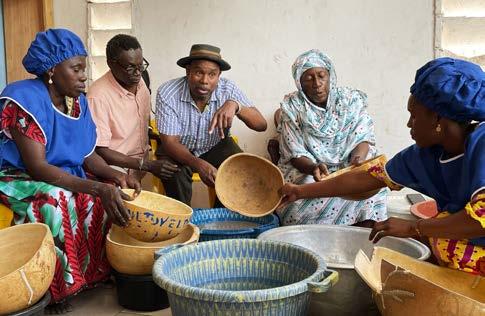
›
s’entretient
As marketing evolves, the partnership will play a crucial role in equipping professionals with the expertise to succeed in the digital age.
Marketing Confederation (EMC) and the African Marketing Confederation (AMC) are joining forces to enhance the global marketing landscape through a strategic partnership focused on sharing best practices, advancing skills, and promoting education in marketing, sales and service.
EMC, which brings together 100,000 marketing professionals across 12 European countries, will collaborate with the AMC, a network of 30,000 marketing professionals spanning 16 African nations. Their shared goal is to exchange knowledge and strengthen competencies, with a particular focus on skills and competency profiles, training and education, and certification.
As the marketing, sales and service industries undergo a rapid transformation – due to data-driven strategies, real-time customer interactions, and AI-powered technologies – expertise has become a critical differentiator for organisations globally. Research, such as the European Marketing Agenda, shows that marketing challenges and opportunities are strikingly similar across regions despite geographic differences.
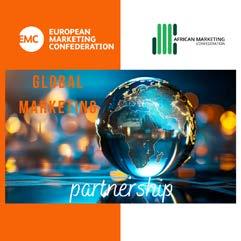
“The trends we are seeing across Europe are mirrored in many ways by the challenges that marketers face in Africa,” says Helen McIntee, co-founder and President of AMC.
“Our member associations are excited about this international collaboration, as it will help them align with global best practices and boost their capacity for cross-border trade.
As digital technologies and data play an increasingly important role in marketing strategies, this partnership is especially vital for developing countries in Africa, where the digital marketing landscape is expanding rapidly.”
One of the first collaborative projects will be the adaptation of the European Marketing Agenda, a report highlighting challenges faced by the industry, for the African market. This new initiative, known as the African Marketing Agenda 2025, will launch in the new year and serve as a key benchmark for marketing professionals across Africa, providing valuable insights into regional challenges, opportunities, and evolving digital marketing trends.
In the European Marketing Agenda, valuable insights were provided into the
common hurdles faced by organisations – including a lack of standardised processes, insufficient availability of subject matter experts, and the challenge of bridging business and IT for digital transformation. The report highlights the overwhelming number of tools and technologies marketers need to navigate, often with unclear purposes or complex integration challenges.
At the same time, the persistent concern over skill gaps within the industry is frequently linked to the lack of specialised training programmes in crucial areas, leaving many professionals without the necessary expertise.
These findings resonate across continents, making the collaboration between EMC and AMC a timely step forward in improving the global marketing ecosystem.
EMC Chairman, Ralf Strauss, emphasises the importance of broadening the association’s perspective: “As EMC continues to grow and solidify its position as a key player in European marketing, it is essential for us to adopt a global outlook. Collaborating with Africa, where the marketing and digital landscape is rapidly evolving, is a natural and important step.”
Mobile internet penetration is at less than a third of the population and a ‘substantial usage gap’ remains, says GSMA’s latest report.
penetration in sub-Saharan Africa reached 27% by the end of 2023, meaning a substantial usage gap of over 60% remains, the GSMA warns in its latest report covering the region. The GSMA represents the interests of mobile operators worldwide.
The usage gap represents millions of people who live within network coverage but face barriers such as device affordability, digital skills deficits, and concerns around online security, the report explains.
These latest figures are a stark reminder to marketers that, as yet, smartphone-based marketing remains in its infancy in many locations and for many people in sub-Saharan Africa.
According to the study released in November 2024, titled ‘Mobile Economy Sub-Saharan Africa 2024 Report’, SSA is the least connected region and has the largest usage gap worldwide.
“Our findings this year reveal both the extraordinary potential and the challenges facing [the region’s] mobile ecosystem,” says Angela Wamola, Head of Sub-Saharan Africa at the GSMA.
“To fully realise the benefits of connectivity, it is essential for operators, policymakers, and stakeholders to address affordability barriers, support infrastructure expansion, and foster collaborations that drive digital inclusion and economic impact.”
Mobile technology is essential in supporting development goals across key sectors like healthcare, education and finance, driving economic growth by expanding internet access and digital services.
The GSMA says the region’s 4G adoption is forecast to reach 50% by 2030, overtaking 3G as the primary technology. Although 5G adoption remains in its early stages, it is projected to reach 17% of total connections by 2030 – primarily in South Africa, Nigeria and Kenya.
The report emphasises the need for progressive spectrum policies, particularly the release of mid-band spectrum, to support long-term growth and equitable digital access. Additionally, 5G Fixed Wireless Access
(FWA) is gaining traction as a primary broadband solution in countries such as Angola, South Africa, Nigeria, Kenya, Zambia and Zimbabwe. This is addressing demand for high-speed connectivity in underserved areas.
To ensure sustainable growth and digital inclusion, the report urges affordability reforms, as high costs remain a barrier to mobile access. It calls for reduced taxes on the sector, such as lowering import duties on handsets and cutting activation fees “to make services affordable and accessible for all”.
According to the GSMA, strengthening digital security is a priority in the SSA region. South Africa recently became the first country in Sub-Saharan Africa to implement GSMA Open Gateway APIs, focusing on fraud prevention and security with Number Verification and SIM Swap APIs.
“This initiative is part of broader efforts across the region to improve digital security, particularly within digital banking,” the report states.
Readers of our Digital Edition can download the full report here
› Connectivity opens up many avenues for economic development and consumer interaction in sub-Saharan Africa. But mobile internet penetration remains low
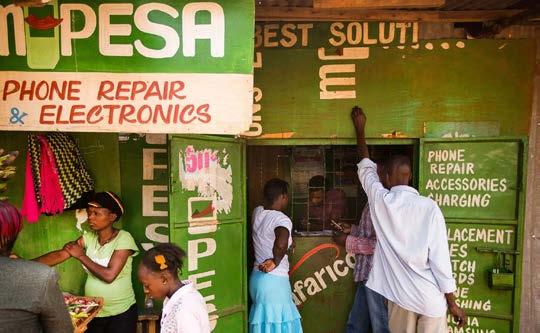
A penetração da Internet móvel é inferior a um terço da população e continua a existir uma “diferença substancial de utilização”, segundo o último relatório da GSMA.
APENETRAÇÃO DA
Internet móvel na África
Subsariana atingiu 27% no final de 2023, o que significa que continua a existir uma diferença substancial de utilização de mais de 60%, alerta a GSMA no seu último relatório sobre a região. A GSMA representa os interesses dos operadores móveis a nível mundial.
O défice de utilização representa milhões de pessoas que vivem dentro da cobertura da rede, mas que enfrentam obstáculos como a acessibilidade dos aparelhos, défices de competências digitais e preocupações com a segurança cibernética, explica o relatório.
Estes últimos números recordam aos profissionais de marketing que, até à data, o marketing baseado em smartphones continua a ser incipiente em muitos locais e para muitas pessoas na África Subsariana.
De acordo com o estudo publicado em Novembro de 2024, intitulado ‘Mobile Economy Sub-Saharan Africa 2024 Report’, a África Subsariana é a região menos conectada e tem a maior diferença de utilização a nível mundial.
“As nossas conclusões deste ano
revelam tanto o extraordinário potencial como os desafios que o ecossistema móvel [da região] enfrenta”, afirma Angela Wamola, directora da GSMA para a África Subsariana.
“Para que os benefícios da conectividade se concretizem plenamente, é essencial que os operadores, os decisores políticos e as partes interessadas resolvam os obstáculos à acessibilidade dos preços, apoiem a expansão das infraestruturas e promovam colaborações que impulsionem a inclusão digital e o impacto económico.
A tecnologia móvel é essencial para apoiar os objectivos de desenvolvimento em sectores-chave como os cuidados de saúde, a educação e as finanças, impulsionando o crescimento económico através da expansão do acesso à Internet e dos serviços digitais.
A GSMA afirma que se prevê que a adopção da tecnologia 4G na região atinja 50% até 2030, ultrapassando a 3G como tecnologia principal. Embora a adopção da tecnologia 5G esteja ainda numa fase inicial, prevê-se que
atinja 17% do total de ligações até 2030 - principalmente na África do Sul, Nigéria e Quénia.
O relatório sublinha a necessidade de políticas progressivas em matéria de espectro, nomeadamente a libertação de espectro na banda média, para apoiar o crescimento a longo prazo e o acesso digital equitativo. Além disso, o cesso fixo sem fios (FWA) 5G está a ganhar força como solução primária de banda larga em países como Angola, África do Sul, Nigéria, Quénia, Zâmbia e Zimbabué. Isto responde à procura de conectividade de alta velocidade em zonas mal servidas.
Para garantir um crescimento sustentável e a inclusão digital, o relatório apela a reformas de acessibilidade, uma vez que os custos elevados continuam a ser um obstáculo ao acesso móvel. O relatório apela à redução dos impostos sobre o sector, nomeadamente a redução dos direitos de importação dos aparelhos e das taxas de activação “para tornar os serviços acessíveis a todos”.
Os leitores da nossa edição xwdigital podem descarregar o relatório completo aqui
› A conectividade abre muitas possibilidades de desenvolvimento económico e de interacção com os consumidores na África Subsariana. Mas a penetração da Internet móvel continua a ser baixa


SINCE ITS EARLY DAYS in the mid-90s, Amazon has grown into one of the world’s largest online marketplaces – with few other platforms wielding such muscle, influence and success.
Today, Amazon’s ecosystem is immense, made up of various interconnected services, technologies, a colossal product range, entertainment (such as Prime Video and Amazon Music), as well as Fire TV (devices that connect to the internet and stream content to a TV) and Alexa (the virtual assistant that uses voice
recognition and natural-language processing to perform tasks).
For brands, navigating this dynamic marketplace can be highly challenging, even disheartening, as the most competent long-term brand strategies only start to show profitable returns after a year, or longer.
So, how can brands, and particularly new brands, navigate this e-commerce landscape? Let’s explore a few critical areas that will guide your brand on its Amazon journey.
As one would expect, understanding Amazon’s vast ecosystem should
Amazon’s launch in South Africa – and possible further regional expansion – offer brands a unique sales and marketing opportunity. But get the basics right first, advises Ashleigh Beddow

be a priority for brands aspiring to excel in this crowded marketplace. This will be a continuous process focused on prioritising research, embracing challenges and change, and driving results.
The next big step is to grasp the fundamental technologies that assist this ecosystem to function more proficiently – Amazon’s highly sophisticated algorithms.
The platform’s algorithms act as gatekeepers for all its shoppers, directing the vast sea of products to deliver the most relevant listings to site visitors. Understanding how these algorithms work and how they can help brands get their products or services to rank higher on Amazon searches is critical for brand success.
A10 is the latest version and is more complex than the A9 pre-2021 version.
It ranks products based on a variety of different factors – including seller authority, click-through rates, off-site traffic, and conversion rates.
A10 is also capable of providing more accurate and user-centric search results backed by machine learning and advanced data analytics. It accomplishes this by focusing on user behaviour (such as time spent on product pages) and by refining relevance scoring, which helps connect users with the products or services they are most likely to purchase.
Refining your brand’s product listings and advertising strategy for Amazon’s algorithms is one way to make it stand out. However, before considering the dos and don’ts of product listing, you need to decide on the right products for your brand to sell.
Although Amazon is becoming less
product-centred and more brandorientated, strong brand positioning on the platform still begins with product selection. Central to this process is conducting product research, which analyses and validates an item’s profitability potential and brandsupport potential.
Questions brand owners need to ask include:
● Will this product enable my brand to stand out among a multitude of competing brands?
● What is my product’s growth potential?
● How favourable will future markets be towards my product?
● How satisfied will potential customers be with my product?
Other areas you’ll need to consider are evaluating the competition and their

product offerings, as well as the various legal and compliance issues brands need to be aware of.
Basically, the aim should be to find or create product opportunities with high customer demand, robust sales potential, and a competitive advantage. A brand’s next step would then be to refine its product listings.
Employing effective product listing tactics is one way to drive your product to the top, and by focusing on elements such as your product’s image, its title, description, features and benefits, and ratings and reviews.
Bottom line: Optimising your product listings to meet A10 algorithm standards is essential for gaining a competitive edge in the Amazon marketplace.
Located above the A+ Content on Amazon’s product detail page, the brand story feature is where you promote your brand’s unique selling points (USPs). While A+ content is often viewed as more valuable for driving immediate conversions and improving product visibility, portraying your brand’s story has a longer-term focus.
Vibrantly portraying the story and highlighting its standout qualities will help you connect with customers on a more personal level. This is an opportunity to humanise your brand, which will drive deeper intimacy with your target audience. Making meaningful and intimate connections is, after all, brand-building’s endgame. Today’s consumer expects brands to go deeper and to connect with them as individuals who have unique lifestyles – as opposed to approaching them as customer types or segments.
Telling your brand story creates an opportunity to achieve this, and to leave a lasting imprint in the minds of consumers. Also share your story in such a way that others will want to share it in turn. Get this right, and your brand has taken the biggest leap in humanising itself, thereby creating trust and a spark of loyalty.
Currently Amazon’s only other online shopping presence in Africa is in Egypt, where it has been operating since September 2021 after acquiring Souq.com and relaunching as Amazon.eg in Arabic and English.
Amazon has previously mooted entering Nigeria, but this was put on hold in the wake of the West African country’s economic challenges.
Effective Amazon ad campaigns animate brand presence, drive sales, and target potential future customers. As such, highly targeted Amazon advertising will help your brand connect with the right people at the right time. Moreover, understanding fullfunnel targeting methodology and the different ad types that are available are essential to drive brand awareness, product consideration, and purchase tactics. Amazon advertising is also key to activating the Amazon Flywheel (a strategy in which various values work together to promote traffic and overall growth) and leapfrogging your ranking in the marketplace.
Amazon DSP (Demand-Side Platform) is another powerful tool that can help brands expand their reach and drive conversions both on and off Amazon.
This programmatic advertising platform provides access to exclusive Amazon advertising inventory. By integrating DSP into a brand’s overall marketing strategy, brands can achieve greater visibility and effectiveness, drive improved customer engagements and, thereby, sales.
Smaller Amazon businesses often have brand managers or owners overseeing data analytics to give new life to brand performance. But even for smaller brands it’s advisable to
enlist a specialist agency with in-depth knowledge of Amazon’s algorithms, ad platforms and best practices.
Ongoing data analytics is crucial for a brand’s Amazon journey because it provides deeper insights into brand performance and fosters improved decision making. By analysing customer behaviour, current sales trends and competitor strategies, brands can sharpen and get more mileage out of their ad campaigns, elevate their product listings for better visibility, manage inventories more effectively, and boost customer satisfaction and loyalty.
Fundamentally, employing data analytics is pivotal for achieving brand success and driving sustainable growth in Amazon’s competitive marketplace. Also choose wisely – the wrong agency can lead to strategic misjudgements, wasted resources, and longer-term negative impacts on brand performance and reputation.
Achieving brand success on Amazon is a journey no brand owner should embark on without full-time help. Enlisting an Amazon management, marketing and advertising agency is essential for brand optimisation in this formidable marketplace.
While many brands start out on Amazon independently, the most successful ones quickly realise that they’ll need full-time support to properly scale their business, maximise full-funnel marketing, and steer operations on a more sophisticated, brand-aware level.
Ashleigh Beddow is Director of Brand Strategy at RT7 Digital, a UK, EU and USA focused Amazon specialist marketing agency with deep roots in Africa. She has extensive experience in managing Amazon strategies for brands like Peugeot and domestic appliances company Haden. She started as a digital content creator, moved to Head of Department, and has been building teams, designing processes, and taking on challenges ever since.

IMM Institute CEO, Irene Gregory, plans to encourage more SA marketers to be involved in AMC’s events and professional qualifications.
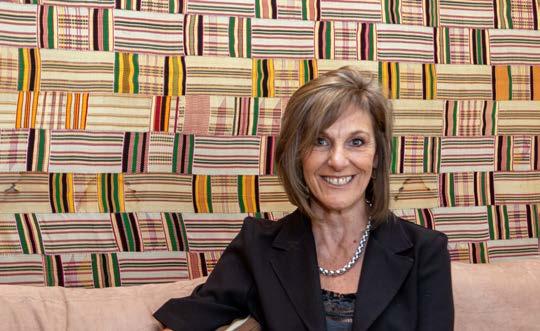
THE INSTITUTE OF Marketing Management (IMM) of South Africa is one of the cornerstones of marketing in Africa, with a rich history dating back to 1948. It built an enviable reputation as a dynamic forum for the country’s marketing community.
Then it fell upon difficult times and there was a long hiatus before it was revived in 2022. Fast forward to 2024 and it is thriving and again providing a home for marketers, as well as those working in supply chain.
At the helm is CEO Irene Gregory, a former executive of the IMM Graduate School, who accepted the challenging of resuscitating the Institute of Marketing Management and returning it to its former glory. That return is well on track, offering a range of activities, events and self-improvement opportunities to a growing membership base.
Gregory feels there’s a natural fit, given that she has an “unwavering passion” for marketing gained over 44 years of wide-ranging experience. It’s not a job. “It’s a natural part of who I am,” she says.
“My enduring enthusiasm for marketing has not only shaped my career, but also inspired me to uplift others by sharing insights, mentoring emerging talent, and fostering growth across the profession,” Gregory adds.
Perhaps reflecting the rapid evolution of the profession, the IMM Institute has developed quickly into new areas.
The ‘home for South Africa’s marketers’ has now become a home for supply chain professionals too – reflecting the natural interdependence that exists between the two in Africa.
“By providing robust platforms for thought leadership and cutting-edge skills development, the Institute equips marketing and supply chain professionals with the tools needed to thrive in a competitive and dynamic environment,” Gregory explains.
“Central to our mission is the cultivation of a vibrant professional network, offering opportunities for marketers and supply chain practitioners to connect, collaborate, and share best practices.”
Recently there has been still another progression, with the formation of the
SMME Associateship category (Institute members are called ‘Associates’) and, with that, an in-house Innovation and Creativity Hub. The initiative recognises the importance of individual entrepreneurs and small businesses in growing the economy (see pg 40).
What’s next for the institute, given so much progress in a short time? “Looking ahead, we are committed to enhancing South Africa’s engagement within the African marketing community, with a key focus on encouraging robust participation in the 2025 AMC Conference in Ghana,” Gregory says.
This fits with her added role as AMC Deputy Vice President for Southern Africa, charged with bringing marketing associations from the region into the AMC fold and creating a collaborative network that strengthens continental ties.
“Moreover, we aim to extend the prestigious Chartered Marketer (Africa) designation, and the soon to be launched Certified Professional Marketer (Africa), to a growing number of professionals in South Africa –cementing our impact not only in SA, but across the continent.”



In conjunction with the institute’s new SMME Associateship membership offering, the hub will empower small businesses, entrepreneurs and start-ups.
of South Africa, one of the founder members of the African Marketing Confederation, has officially launched its Innovation and Creativity Hub aimed at empowering small businesses, entrepreneurs and start-ups.
In tandem with the hub, the institute has unveiled its SMME Associateship, which enables individuals running SMMEs to become associate members and gain access to a range of benefits.
Thus, the IMM Institute no longer only caters to marketers and marketing businesses, but also those in supply chain, business management and SMMEs, as these sectors converge in the digital age.
The Innovation and Creativity Hub launch took place at the IMM Graduate School in Johannesburg as part of the regular IMM Friday breakfast gatherings. The guest speaker was Bernard Jansen, Founder of Firejuice, a strategic marketing consultancy that specialises in assisting entrepreneurs and small businesses in Africa.
Following his presentation, which emphasised that achieving long-term entrepreneurial success requires a
solid marketing foundation, Jansen joined a panel discussion with three other entrepreneurial marketers who are all members of the institute.
Thereafter, a small group of local entrepreneurs told their stories of business success to the IMM Friday gathering.
Within the Innovation & Creativity Hub of the IMM Institute, SMME Associates have access to an office environment without having the expense of setting up their own physical space. It also brings like-minded people together so they can share ideas and solutions to challenges, while allowing them to forge relationships.
“By providing a collaborative space, comprehensive resources, and a robust network of mentors and investors, the hub will act as a catalyst for business success and sustainability. We are committed to nurturing talent, driving

creativity, and creating a thriving ecosystem where ideas can flourish and enterprises can scale,” explained Irene Gregory, CEO of the IMM Institute.
She added that small businesses will benefit from being able to tap into online learning courses from the institute that cover aspects spanning personal development, wellness, financial literacy, and complete business development.
In addition to this, the institute’s more established members – those with 10 years of operation or more –will act as mentors to the SMMEs.
A further incentive for SMME Associates is the opportunity to participate in the Annual IMM Institute Excellence Awards through the new Entrepreneur of the Year category. This will celebrate exceptional innovation, leadership and vision in the entrepreneurial space.
Three finalists will be selected, with the winner announced at the awards evening on 7 March 2025.
You can find out more about the IMM Institute here
Country aims to boost record tourism numbers even further through a range of development projects, including in the MICE sector.
country of Morocco is looking to boost its already record levels of tourism even further as it gears up to be a FIFA World Cup co-host in 2030, along with Spain and Portugal.
Morocco attracted a record 14.5-million tourists last year, and has a target of 17.5-million visitors in 2026 and 26-million by the time the World Cup arrives.
“In the first half of 2024, 7.4-million tourists visited Morocco, marking a 14% increase on the same period in 2023,” the Abu Dhabi-based newspaper, The National, reports, quoting Imad Barrakad, Chief Executive of the Moroccan Agency for Tourism Development.
“It anticipates ending this year with 15.5-million to 16-million tourists, driven by marketing campaigns, higher airline connectivity, hotel openings and a focus on promoting Moroccan gastronomy, culture and villages.”
As it looks ahead to the soccer tournament, Morocco is seeking investors to help develop new infrastructure ranging from hotels to stadiums, conference facilities and theme parks.
In 2023, Morocco launched its Investment Charter, which aims to make the country attractive to foreign and domestic investors by offering incentives, subsidies and grants to companies.
Incentives include government financial contributions for up to 30% of an eligible project’s total investment amount, exemptions from paying VAT on capital equipment or materials acquired locally for a period of 36 months, and

custom duty exemptions on imported goods or equipment for 36 months.
“We are looking at more investments in luxury and mid-scale hotels, leisure parks and the MICE (meetings, incentives, conferences, and exhibitions) infrastructure,” Barrakad told The National
At a recent hospitality summit in Dubai, Morocco promoted opportunities such as a US$40-million investment plan to develop an amusement park in Casablanca, the largest city and economic hub, and a resort and theme park project in Marrakesh, a popular tourist centre and fourth-largest city.
As a key part of its tourism development strategy, the country is also investing heavily in its aviation sector. National airline, Royal Air Maroc, is planning to quadruple its fleet to 200 aircraft by 2037, while airport capacity is anticipated to double to more than 90-million passengers by 2035.
Ahead of the World Cup the country is expanding three major airports: Marrakech, Casablanca and Agadir.
According to the International Air Transport Association, Morocco has the potential to play a key role in linking Africa to Europe and North America.
However, the expected influx of soccer fans has officials concerned about the risk of over-tourism in popular destinations.
“We’ve seen over-tourism around the world, so we need to make sure we develop wisely. We need to make sure we don’t think only about the World Cup and the six cities [hosting games],” Morocco’s Minister of Tourism, Fatim-Zahra Ammor, said at the Future Hospitality Summit in Dubai in October.
In 2018, Rwanda’s tourism marketing body took a bold step and sponsored a top-flight English soccer club. Has it worked? Fiona Zerbst investigates.
IN RECENT TIMES, RWANDA has captured international attention not only as a rising tourism destination, but as a sponsor of high-profile soccer teams such as Arsenal Football Club from England, Paris Saint-Germain of France, and Bayern Munich of Germany.
It’s a far cry from 30 years ago, when Rwanda was best known for conflict and genocide. The fourth smallest country on the African mainland had a high profile for all the wrong reasons – but it’s since resolutely worked at reshaping its global image.
It has made strides in every developmental metric, has a majorityfemale parliament, and is aiming to be a middle-income country by 2035, thanks to its ambitious Vision 2050 roadmap. Even though it’s a landlocked nation of only around 13-million people, Rwanda punches above its weight.
Previously reliant on agriculture and subsistence farming, it has diversified its economy, with tourism one of its most impressive industries. In 2023, it generated more than US$620-million and welcomed 1.4-million visitors to a country that has seldom been on people’s bucket lists.
This isn’t only due to gorilla trekking and viewing game in its three impressive national parks, however.
Visit Rwanda – the country’s tourism agency – has struck deals with a slew of high-profile sporting clubs and in the process remade its image, profiling the
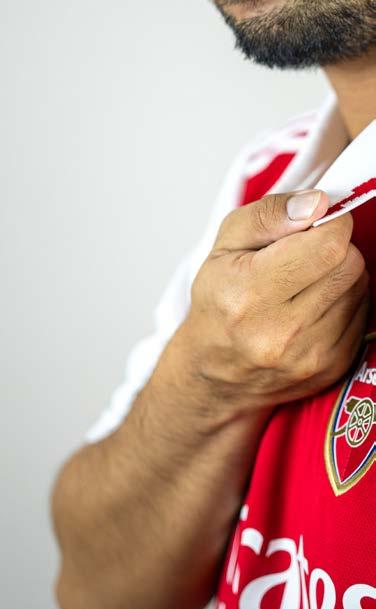
country as an ambitious player on the global stage.
RWANDA’S COMMITMENT TO SPORTING EXCELLENCE
Few people know that sport – particularly soccer – played a major role in alleviating
tensions in the country after the 1994 genocide, says Gary Rathbone. He is founder and director of Sportscape Media, which provides consulting and advisory services to organisations involved in the sports media landscape in Africa and elsewhere.

Local and national tournaments were organised by the new government to encourage national unity and heal the country. The Association of Kigali Women in Sports (AKWOS) was set up in 1997 to assist women, who made up most of the genocide survivors. Soccer,

In a 2022 survey,
a male-dominated sport, empowered these women and the sport remains gender-inclusive to this day.
It was therefore of great national significance that, in 2018, Visit Rwanda and top English Premier League club Arsenal forged a three-year partnership,
with the club becoming the country’s official tourism partner.
In 2021, the partnership was extended for another four years. Visit Rwanda sponsors the shirt sleeves on the team’s matchday kit, with the logo seen 35-million times a day around the world,
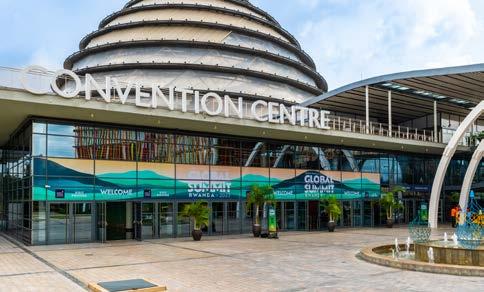
according to Visit Rwanda’s website.
Although opponents label the deal as ‘sportswashing’ – a way to take attention away from Rwanda’s sometimes controversial politics –many soccer fans recognised it as a canny exercise in bringing top-level global sport closer to Africa.
“The sponsorship is a powerful tool in repositioning Rwanda on the global stage,” says Nqobile Ndlovu, founder and CEO of Cash n Sport, an Africafocused sports research company. “I have no doubt that partnerships with globally recognised football teams such as Arsenal will enable the Visit Rwanda brand to reach international audiences, promote Rwanda as a key destination, and contribute to the country’s economic growth.”
Arsenal has distanced itself from any political wrangling, stating that the partnership is with the country’s national tourism body. But there’s no getting away from the fact that President Paul Kagame is a polarising figure. His critics view him as authoritarian and intolerant of dissent. In 2022, he signed a controversial agreement for the UK to deport asylum seekers to Rwanda – a plan that was declared unlawful by the UK Supreme Court in 2023.
“The partnership feels out of touch, given the political situation in Rwanda,” says Joe Draganic, an Arsenal fan based in Canada. “It’s at odds with Arsenal’s inclusive image and distracts from more pressing issues, such as human rights violations, rather than creating a meaningful exchange that benefits fans or the community. It also inadvertently legitimises leadership than many find controversial.”
David Krone, a former professional soccer player based in South Africa, agrees, but adds, “You’d probably be hard-pressed to find a country that doesn’t have similar problems. It’s unlikely to put people off visiting the country – and the Visit Rwanda logo, which is simple and compelling, will definitely lure visitors.”
Rathbone believes one can criticise the country while still applauding it for its foresight. “It always amazes me how few countries understand the value of marrying sport with tourism, especially given the number of people it can
engage, and what it can do for perceptions of a nation,” he says.
“Arsenal has a huge African fan base, which means fans will be impressed by Rwanda’s ability to pull off something like this, and the English Premier League’s global viewers will care far less about the country’s politics than about the sport itself, and this will drive greater interest in the country.”
The English Premier League (EPL) is the most-watched football league in the world. Pulse Sports, a prominent online media platform, says the diverse talents of players from 70 different countries help to drive its popularity, with EPL matches watched in more than 800-million homes every weekend.
With the Visit Rwanda logo prominently displayed on the Arsenal kit at the 60,000-capacity Emirates Stadium in London, at away grounds across the UK and Europe, during live and recorded broadcasts worldwide, and on social media platforms almost everywhere, it’s difficult for fans to ignore the message. Arsenal’s own extensive media platforms also showcase Rwandan attractions such as its wildlife and coffee.
According to a 2022 survey conducted
by the club, over half of Arsenal fans reported an increased likelihood to holiday in Rwanda and 55% of those aware of the partnership felt it has improved their perception of Rwanda. Before this collaboration, 75% of Arsenal supporters were unaware of Rwanda as a tourism destination, highlighting a breakthrough in global visibility.
African football fans are enthusiastic about the deal. “It’s increased Arsenal’s fanbase in East and Central Africa,” points out Kelvin Gatheru, an Arsenal fan from Kenya.
“Kenyan fans wish it was our logo on the players’ sleeves. Although some Western countries don’t support what Kagame does, he’s made Rwanda more habitable, an innovation hub and a desirable tourist destination, especially as former and current Arsenal players visit every year. I see the deal as a reward for change.”
This point is echoed by Rathbone, who notes that the country can also be applauded for its effort to “work for everyone” and become “and island of stability in a region of conflict”.
Nigerian journalist Adenaike Raphael says he would visit Rwanda despite the country’s patchy governance and human rights record.
“The ‘Visit Rwanda’ initiative underlines the fact that the country is safe to visit and there are beautiful locations to explore,” he says. However, he does feel that Arsenal’s association with the country could be a potential reputational risk.
Alongside its sponsorship with Arsenal, Rwanda’s other smaller strategic partnerships with Paris Saint-Germain (PSG) and Bayern Munich have helped to showcase the country as a tourism and investment destination.
“These collaborations serve as complementary initiatives, each aimed at reaching distinct fan bases and expanding Rwanda’s brand in diverse European markets. Engaging with multiple clubs enables Rwanda to tap
According to UK-based commercial law firm Walker Morris, the front-of-shirt placement, along with sleeves and training kits, remains the most sought after among English football’s topflight sponsors.
“Consideration as to what is camera-facing during matches, and visibility in other media formats, is paramount,” the firm advises.
“The lifecycle of any shirt design must be taken into consideration
into broader audiences and solidify its position within the international sports landscape,” says Ndlovu.
Paris Saint-Germain (PSG) and Rwanda recently renewed their partnership to 2025, with the French team promoting Rwanda as a tourism and investment destination, talking up its tea and coffee, and focusing on football, fashion and arts development in Rwanda. The PSG logo appears on the men’s team’s kits and Rwandan artists can perform at the PSG stadium.
Frequent digital and social media campaigns associated with this partnership enhance Rwanda’s visibility among PSG’s global fanbase, many of whom were previously unfamiliar with the country as a travel destination. This
and any potential design changes during the course of the agreement (particularly for teams who happen to change leagues from one season to the next).
“Exclusivity is again relevant here –ensuring that the sponsor’s logo does not conflict with another on the kit.”
Walker Morris says Premier League sponsorship spend hit an all-time high value of US$1.7-billion for the 2023/24 season, “highlighting the lucrative opportunities these deals present”.
deal strategically targets both French and European audiences while also engaging PSG’s substantial following across Africa, notably in the Francophone countries, aligning well with Rwanda’s tourism objectives to attract both African and international visitors.
Research by Cash n Sport indicates that since the initiation of this partnership, visits to Rwanda have reportedly increased by 22% among PSG fans, demonstrating the collaboration’s effectiveness in increasing awareness and interest in the country.
In 2023, Rwanda entered a five-year deal with Bayern Munich, a powerhouse in Germany and in European soccer competitions. It includes plans to establish a football academy in

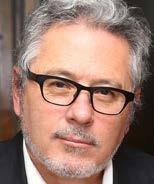

Rwanda, where young players and coaches will receive training aligned with the country’s commitment to developing local sports talent.
Having Arsenal’s soccer coaches work with Rwandan coaches to develop local football will help with further professionalisation, which will boost funding for sports infrastructure, close skills gaps, and develop grassroots talent.
Rwanda’s Sports Development Policy explicitly mentions the promotion of social cohesion and economic benefits, positioning sport as one of the key enablers of several sustainable development goals (SDGs) in the country – including health (SDG 3), education (SDG 4), gender (SDG 5), decent work and economic growth (SDG 8), and equality (SDG 10).
While all this sounds impressive, critics have questioned whether money allocated to sports sponsorships would be better spent on health, education and social welfare directly, which would help to tackle challenges such as poverty and inadequate healthcare access in rural areas.
However, the Rwandan government has clarified that the funding for these sports sponsorships is sourced from tourism revenue, which remains one of the country’s top foreign exchange earners.
“This connection highlights the government’s belief in a symbiotic relationship: as tourism flourishes, it generates the necessary financial resources to support these sponsorships, while the partnerships promote Rwanda as a tourist destination,” says Ariella Kageruka, Head of Tourism and Conservation at the Rwanda Development Board (RDB), in a soundbite played on US radio station WCBE 90.5 FM.
The RDB’s view is that a surge in tourism will lead to job creation in local hospitality sectors, stimulate economic growth and enhance the overall standard of living.
Rwanda offers important lessons on how high-profile sporting partnerships can generate returns for the country. But the country needs to show these economic benefits are sustainable and can improve the lives of ordinary citizens.
Monitoring tourism revenue, employment figures and community impact would help to determine the real value of such investments for the
country. However, the remarkable 24% increase in Rwanda’s tourism revenue between 2019 and 2023 suggests that top-level soccer sponsorship does have the potential to drive economic growth across the country.
Advanced data analytics and stakeholder feedback mechanisms would be able to provide insights into how these partnerships influence consumer behaviour and brand perception in various markets.
Draganic says the deal still feels more like a superficial marketing exercise rather than one based on shared value. “It doesn’t seem especially relevant to football or the fan experience,” he argues. “Fans may be more interested in seeing sponsorships that align directly with football values or offer perks, rather than abstract political alignment.”
Ultimately, although sponsorships are part of modern sport, they may not be particularly impactful on the core of what fans value about the team. “Fans are primarily focused on Arsenal’s performance – the quality of play and the trophies they bring home,” Draganic points out.
Fiona Zerbst has been a journalist and editor for over 20 years. She writes primarily about business and finance and has worked for publications and clients in South Africa, Botswana, Zambia, Nigeria, Canada, Finland and the UK.
NOTE FROM THE EDITOR:
For this article we reached out to several people in the Rwandan tourism and marketing communities for interviews.
We received no response.
We also approached Arsenal Football Club for an interview, which was eventually declined.
Is the sponsorship agreement working for both parties or not? Is it going to continue? Is this silence by the parties ominous? Unfortunately, we simply don’t know.


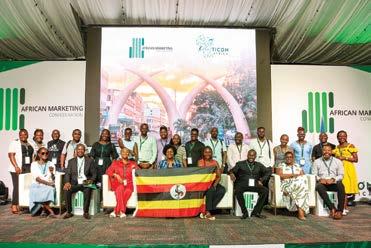






› The rickety old pickup that Night previously used
ONE DAY IN AUGUST
Struggling single mother of five has her ‘death trap’ pickup truck replaced so that she can keep supporting her family as a fruit vendor.
2024, a lady named Night Ampurire, a humble fruit vendor and single mother of five, captured the hearts of the news team at TV station NTV Uganda as she drove a rundown deathtrap of a pickup truck to keep her business afloat – usually

with her youngest child in her lap or strapped to her back.
NTV News duly broadcast Night’s story of struggle, hard work and commitment to her family, which caught the attention of management at MTN Uganda. The instruction came down to the marketing team: We are getting one of our fleet vehicles ready. Find Night Ampurire, confirm her circumstances, and arrange a surprise handover.
Stuart Ronald, Regional Marketing Coordinator, was appointed secret agent and, for three days, disguised himself as a typical customer purchasing watermelons and pineapples while he found out all he could about Night –including, crucially, her movements so that the surprise handover could be properly coordinated.
Two weeks later, with the vehicle ready for delivery and suitably liveried for the occasion, the MTN Uganda team – led by CEO Mulinge Sylvia and including GM Corporate Affairs, Enid Edroma – lay in wait for Night to arrive in her battered fruit-laden pickup at Kitooro Market in Entebbe.
When the team emerged and explained
to Night how her life was about to change, she was understandably ecstatic and broke into tears. Shoppers and other traders shared in her joy as the new vehicle was handed over.
MTN Uganda also gave Night a quantity of fuel and provided a safety seat for her youngest child. Britam Uganda provided insurance for the vehicle.
“The joy on her face as her old truck was replaced, fruit by fruit, was a moment we will never forget as she danced and thanked MTN for this great surprise that will transform her business,” MTN Uganda said in a LinkedIn post.
“As Sylvia Mulinge put it, ‘Today, we don’t just hand over a new truck; we celebrate the power of resilience, the strength of community, and the unstoppable spirit of a woman who refused to give up. Night Ampurire, your journey inspires us all. Together, we are unstoppable’.”
Vivo Energy Uganda, the local Shell distributer in the country, has also entered into the spirit of the occasion and provided Night with a one year’s supply of fuel and vehicle servicing for her Nissan double cab.
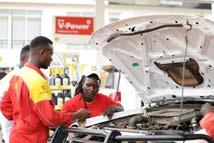
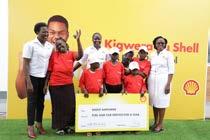
“[Our] contribution will help her manage operational costs, increasing her chances of success,” the company said. Readers of our Digital Edition can watch the original NTV Uganda news report here, and a news report of the vehicle handover here



‘ Thrift’ and ‘pre-loved’ markets are
Increased reliance on secondhand goods indicates how economic challenges are reshaping consumer behaviour in African markets.

INFLATION HAS BEEN A persistent issue in West and Central Africa, eroding the purchasing power of consumers and making it difficult for many households to afford essential goods and services.
According to Pierrine Consulting, a Nigerian-based marketing research and strategy firm, this shift has led to a re-evaluation of purchasing habits, with more people turning to secondhand markets as a cost-effective alternative.
“The increased reliance on secondhand goods has fuelled the growth of the thrift and declutter market,” the consultancy says in a blog post.
“On the demand side, consumers are increasingly seeking out affordable options in response to economic pressures. On the supply side, the market has been bolstered by the growing trend of decluttering, where individuals sell or donate items they no longer need, contributing to a
continuous flow of goods into the secondhand market.”
Consequently, the number of thrift stores and online marketplaces has increased significantly across the region. These platforms offer a convenient way for consumers to buy and sell secondhand goods, with many leveraging social media to reach a wider audience.
“In urban centres – particularly in Nigeria, Ghana and Côte d’Ivoire – thrift stores are becoming a common feature, providing a diverse range of products to meet the needs of different consumer segments,” Pierrine Consulting states.
Informal secondhand markets, often referred to as ‘bend-down’ or ‘tokunbo’ markets, have been a staple in many African countries for decades.
However, recent economic challenges have driven more traffic to these markets as consumers seek out cheaper alternatives. These markets offer a wide
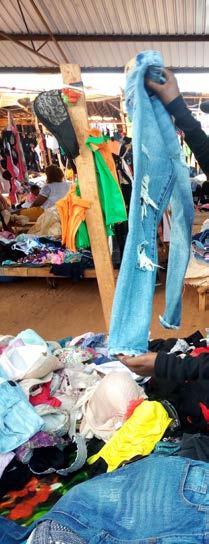
variety of goods, from clothing and accessories to electronics and household items, and play a crucial role in meeting the needs of low-income consumers.
“The growth of the thrift and declutter market also aligns with broader environmental and economic benefits,” says the consultancy.
“By promoting the reuse of goods, these markets help reduce waste and support sustainable consumption practices. Additionally, they provide

economic opportunities for small-scale vendors and entrepreneurs.”
According to Pierrine, the increased reliance on secondhand goods and the growth of the thrift and declutter market are clear indicators of how economic challenges are reshaping consumer behaviour in West and Central Africa.
But it isn’t only in West and Central
Africa. In East and Southern Africa, ‘pre-loved’ items are also in demand because of affordability challenges. Secondhand clothing, in particular, is big business.
Kenya alone imported 177,386 tonnes of used clothing in 2022, a 76% increase on the amount imported in 2013, according to United Nations trade figures. Similarly, data from the Chinese government indicates that China’s secondhand clothing exports to Kenya rose by 86.2% year on year in the first quarter of 2024.
In Uganda, another East African market, secondhand clothing is similarly sought after. The Uganda Circular Textile project says the country imports 80,000 tonnes of used clothing each year to meet the demand from consumers for affordable clothing in the country. These goods are imported as bales from the US, China or Europe.
The project’s goal is to redirect secondhand clothing from landfills to local businesses that can repurpose the otherwise-discarded items into new products.
According to the Observatory of Economic Complexity, an online data platform focused on the geography and dynamics of economic activities, the top 10 African importers of secondhand clothing (based on 2022 figures) are Kenya, Ghana, Tanzania, Angola, Nigeria, Cameroon, Mozambique, Benin, Madagascar and Togo.
An estimated 4.9-million people in East Africa make their living from the trade, most of them women, the Mitumba Consortium Association of Kenya, a trade body, estimates. ‘Mitumba’ is a Kiswahili word meaning ‘bale’ or ‘bundle’, because it typically arrives from overseas in bales. So, job creation is a positive. But some critics of secondhand clothing imports point out that if manufacturing of new clothing in African countries had not been decimated by economic liberalisation policies introduced in the late 80s and early 90s, more jobs
would ultimately have been created in the sector than is now the case.
The environment is a big loser. The quality of some clothing arriving on the continent from overseas is so poor that it cannot be sold and ends up in landfills, rivers, streams and elsewhere. Essentially it is a giant pollution problem that is being exported to Africa from more developed countries.
But there is a fightback taking place as entrepreneurial African businesses see the potential in consumers’ demands for cheap clothing.
In Zimbabwe, for example, the long-established Edgars fashion retail group has just resuscitated its Express no-frills clothing stores, which it killed off in 2011 and rebranded as Jet stores.
The new Express Stores offering is aimed at lower-income consumers wanting to buy new clothes rather than second-hand items. To achieve the pricepoint required – between US$1 and US$10 for a new garment – the stores are basic and cash-based. Some outlets will be mobile stores or housed in old shipping containers to keep prices down.
Crucially, the supply chain is being localised within Zimbabwe, with products manufactured in Bulawayo at the company’s Carousel plant. According to a report in NewsDay newspaper, the facility is being retooled to increase production volumes from 45,000 to 100,000 clothing units per month.
Exporting of items made at the Carousel plant is also on the cards, meaning a new source of good-quality, low-cost clothing for other African markets. The aim, with time, is to export to South Africa, Zambia, Malawi, Kenya and Tanzania.
Zimbabwean economist Chenayimoyo Mutambasere, quoted in Newsday, points out that that in the lower-income demographic, clothing is often viewed as a ‘want’ rather than a ‘need’, which means essentials take priority over fashion purchases.

To develop Marketers into positions of influence.
Promoting professional development of Marketers in Malawi.
Setting best marketing practice standards. Offering professional marketing training courses.
Networking opportunities for Marketers. Organising marketing events. Providing guidance to marketing students.
We have individual and corporate membership categories.
Membership runs from 1st April 2023 to 31st March 2024.
To become a member contact Vidah Mmadi on +265 991 00 83 88.


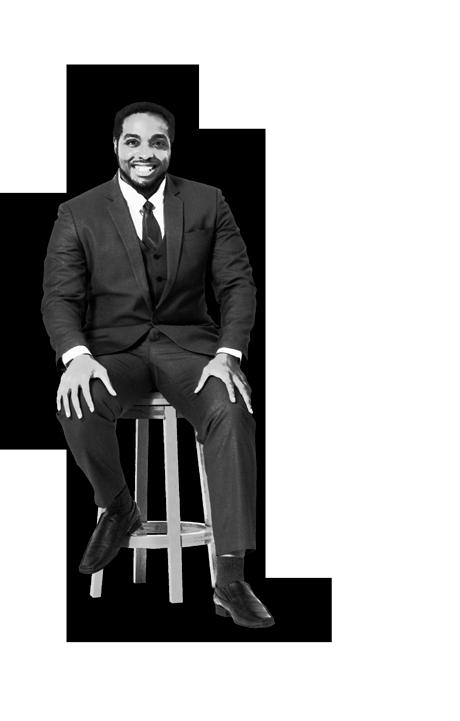
George Damson takes over from Isabel Kachinjika, who encourages new board to keep the vision alive through innovation.
Marketing in Malawi, one of the founder members of the African Marketing Confederation, recently announced the election of George Damson as its new President. He previously served as Vice President of IMM Malawi.
The new president, committee members and board were unveiled during the institute’s 2024 IMM Marketers Conference held at the Sunbird Nkopola Lodge in Mangochi, Lake Malawi.
“I am committed to fostering an inclusive community where diverse voices are heard, valued and integrated into our decision-making processes,” Damson said in his acceptance speech.
He is the Managing Director of Blitz Interactive Agency, a Malawian brand communication agency. His expertise spans business development, sales, marketing strategy, public relations, event planning and management, project planning and management, brand management, market research, and digital marketing.
According to a report by Times 360 Malawi, Outgoing President, Isabel Kachinjika, encouraged the new board to keep the IMM vision alive through innovation and pushing beyond boundaries.
“I have grown with IMM, and I carry with me the lessons I learned from each member. This role has taught me that when we innovate from a place of passion and purpose, we not only elevate our work but also those around us,” she said.
This year’s IMM Marketers Conference theme was ‘Innovate to Elevate: Leveraging Technology for Marketing Success’.
Among the speakers was Nanzala Mwaura, Chief Growth Officer for Sub-Saharan Africa at Ipsos, who discussed the topic ‘Digital Transformation: Shaping Customer Experiences with Technology’.
Jose Alfaro, Social & Digital Analyst Senior Associate at the Sabin Vaccine Institute in Washington DC, took to the stage to deliver an eye-opening presentation on ‘Building a Data-Driven Marketing Culture’.
All things digital were also addressed by Taffy Gotora – Zimbabwean author, keynote speaker, multiple awardwinning digital marketing expert and lecturer. She gave a Digital Marketing Masterclass to delegates.

Themba Nkuna raised the energy in the room as he delivered an electric presentation on ‘Harnessing Big Data for Targeted Marketing Strategies’.
The IMM Malawi kicked off day three of the conference with the Graduation Ceremony of the 2024 Professional Certificate in Digital Marketing intake. There were hearty congratulations all round!
Proceedings for this year’s conference closed with the 2024 IMM Marketing Excellence Awards, which was broadcast on Mibawa Television. Readers of our Digital Edition can watch a recording of the broadcast here
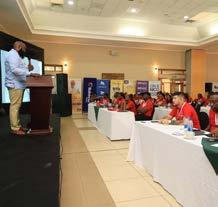
Continent’s most affluent buyers defy expectations, given that the luxury market is under increasing pressure in certain other regions of the world, most notably China.
DESPITE A
challenging economic environment in much of Africa, including high inflation in many countries, the demand for high-end luxury goods continues to be strong. This is according to the annual ‘State of the Luxury Market in Africa’ report from Luxity, a prominent reseller of pre-owned luxury fashion items.
The company says the continent is defying expectations, given that the luxury market is under strong pressure in some other regions of the world, notably China.
The Asian country has typically been a strong performer for luxury brands, but 2024 has seen the market slow down due to weakened consumer spending, shifting buyer priorities toward bargains, and a slower-thanexpected economic recovery.
In an interview with Channel Africa, Michael Zahariev, co-founder of Luxity, noted that South Africa, in particular, has become a key hub for luxury goods. Luxury retail trading density has risen by 8%, outperforming the global average.
He said South Africa and Morocco are the only two African nations housing official brand stores such as Louis Vuitton and Gucci.
LUXURY FASHION CAPITAL OF AFRICAN CONTINENT
“[South Africa] has essentially become the fashion capital of Africa, with many luxury shoppers from across the continent travelling to cities like Cape Town and Johannesburg for the unique shopping experience,” he told Channel Africa
“Accessibility is a major factor driving this trend, as it is easier for African consumers to visit SA than to travel to Europe or other luxury shopping destinations.”

The ‘State of the Luxury Market in Africa’ report states that major malls in South Africa, such as the V&A Waterfront in Cape Town, are continually positioning themselves as luxury destinations, with the development of new luxury wings catering to this growing demand.
“With the largest population of high-net-worth individuals in Africa and a strengthening market sentiment, we anticipate the luxury market in South Africa to continue outperforming global growth,” Luxity highlights.
Mid-range luxury watches emerged as a standout sub-category in Africa this
year, experiencing a significant 28% growth and reflecting an increasing interest in accessible luxury segments.
“This interest in accessible luxury is also translating well to the pre-owned industry, where consumers are seeking value-driven luxury options that offer prestige at a more attainable price point,” the report adds.
The pre-owned luxury segment has also maintained its growth trajectory, thriving both in-store and online.
Brands primarily associated with watches and jewellery – such as Rolex, Hublot, and Van Cleef & Arpels –significantly outperform fashion brands in terms of resale value retention, with Rolex standing out by reselling at 104.9% of its retail price.
Readers of our Digital Edition can find out more about the report here
› Nigeria’s Minister of Industry, Trade and Investment, Dr Doris Uzoka-Anite, launches the informal economy report
Minister of Industry, Trade and Investment committed to ‘targeted intervention’ when report into the informal sector was launched in Abuja.
economy, making up 24% of all informal businesses.
economy contributes substantially to Nigeria’s GDP and can be effectively mobilised to unleash the country’s full economic potential and provide much-needed support to the most vulnerable households.
This is according to the Managing Director of Moniepoint Microfinance Bank, Babatunde Olofin, who was speaking during the launch of the ‘2024 Nigeria Informal Economy Report’ in the city of Abuja.
The report is powered by Moniepoint in collaboration with the Small and Medium Enterprise Development Agency of Nigeria (known as Smedan) and the Federal Ministry of Industry, Trade, and Investment.
Minister of Industry, Trade and Investment, Dr Doris Uzoka-Anite, who formally launched the report, reiterated
the Federal Government’s commitment to supporting small business operators in the informal sector of the economy. She pointed out that the informal sector, which often appears to be forgotten, would henceforth begin to enjoy government’s interventions and incentives.
“This segment plays a significant role in the Nigerian economy [and] we can now bring them up to enjoy incentives that the government is providing to the broader economy as well,” she said.
Also delivering a goodwill message, the Chairman of the House Committee on Small and Medium Enterprises, Mansur Manu Soro, said the House was taking deliberate steps to prioritise women operating in the informal sector to end gender disparity in earnings.
Some of the key insights from the report include:
● Retail and general trade is the leading sector within the informal
● The youthful demographic is a critical driving force of Nigeria’s informal economy, with over 57.7% of business owners being under 34 years old.

● There is untapped earning potential in the informal segment, with the average monthly income below N250,000 (approx. US$157). Only about 1.3% of businesses in the informal economy earn above N2.5-million (approx. $1,770) monthly..
According to an October 2024 report by global consultancy EY, and published by the World Economic Forum, the sustainable growth of emerging markets hinges on the informal economy.
In Kenya, for example, more than 15-million people are maintaining livelihoods and building opportunities across the entrepreneurial, informal economy. They work as motorcycle delivery drivers, run small kiosks or hair salons, open cyber dens, and engage in e-commerce and gig work.
EY says this ‘invisible’ 83% of the population accounts for 24% of Kenya’s gross domestic product, meaning the informal economy employs five times more workers than the formal economy and creates jobs at a rate that is 10 times as fast.
Readers of our Digital Edition can find out more about the ‘2024 Nigeria Informal Economy Report’ here and the EY report here
CIMG National President outlines many successes in a busy year that included the release of two reports and collaborations across Africa.
Institute of Marketing, Ghana, one of the founder members of the African Marketing Confederation, recently held its 34th Annual General Meeting at the Lancaster Hotel in Accra, where the National President, Dr Daniel Kasser Tee, gave an account of the Governing Council’s stewardship in the year under review, 2023.
In his address, Dr Kasser Tee emphasised the Governing Council’s decision to base its advocacy on marketing-related matters on scientific research. He specifically highlighted the completion of the third wave of the ‘Ghana Customer Satisfaction Index (GH-CSI) for the Banking Industry’ in 2023, noting that the report has been published.
The National President also expressed his enthusiasm for the launch of the ‘Ghana Regional Brand Index’ report, a survey conducted across all 16 regions of Ghana to uncover and showcase the economic and tourism potentials of each region. He stated that “several rounds of stakeholder engagements have been held with various ministries, agencies,
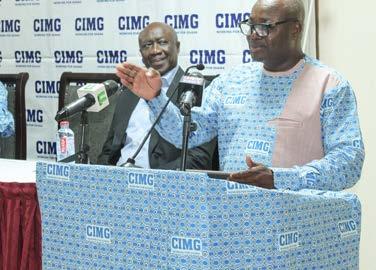
and private sector organisations since the report’s successful launch.”
Additionally, he reiterated CIMG’s commitment to commemorating World Consumer Rights Day by “expanding its activities to engage both consumers and corporate organisations that provide goods and services, in line with its mandate under section 3(e) of the Chartered Institute of Marketing, Ghana Act 2020 (Act 1021).”
Dr Kasser Tee acknowledged the institute’s strong relationships with corporate organisations, media and professional bodies, which have led to significant collaborations across the continent. He also highlighted efforts to enhance the membership drive through partnerships with traditional and technical universities, as well as tutorial colleges serving as Tuition Centres for the Professional Marketing Qualifications (PMQ). These initiatives are “aimed at driving membership and promoting the PMQ”, he said.
Special recognition was given to Dr Francis Mensah Sasraku and Mr Adam Sulley for their outstanding
contributions to the growth of the institute. Their work in successfully integrating the PMQ programme in Ghana has been instrumental, the National President said. In 2023, CIMG achieved pass rates of 78.04% and 79.91% for the PMQ examinations in June and December, respectively.
As part of the membership drive, Dr Kasser Tee reported on the success of the Continuing Professional Development (CPD) programme, which supports the career progression of marketing professionals. In the year under review, 148 professionals were conferred the Chartered Marketer designation, and record cards for a new batch have been compiled, reflecting growing enthusiasm for the programme.
On strengthening the Secretariat, Dr Kasser Tee mentioned the recruitment of new staff and plans to further enhance capacity through future recruitments to achieve a balanced workforce. He also highlighted the institute’s strides in digitisation, including the exclusive use of digital payment platforms and ongoing efforts to digitise the database and processes for improved business transformation.



Become a member of your local Marketing Association to unlock AMC benefits:
• Access to all AMC publications including the prestigious quarterly Strategic Marketing for Africa magazine
• Attendance at AMC’s wide range of networking events
• Access to educational opportunities including the Chartered Marketer (Africa) professional qualification
• Reduced rates on short courses
• Access to up-to-date marketing research projects conducted on the African continent